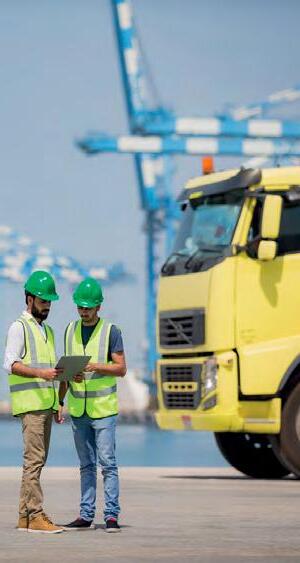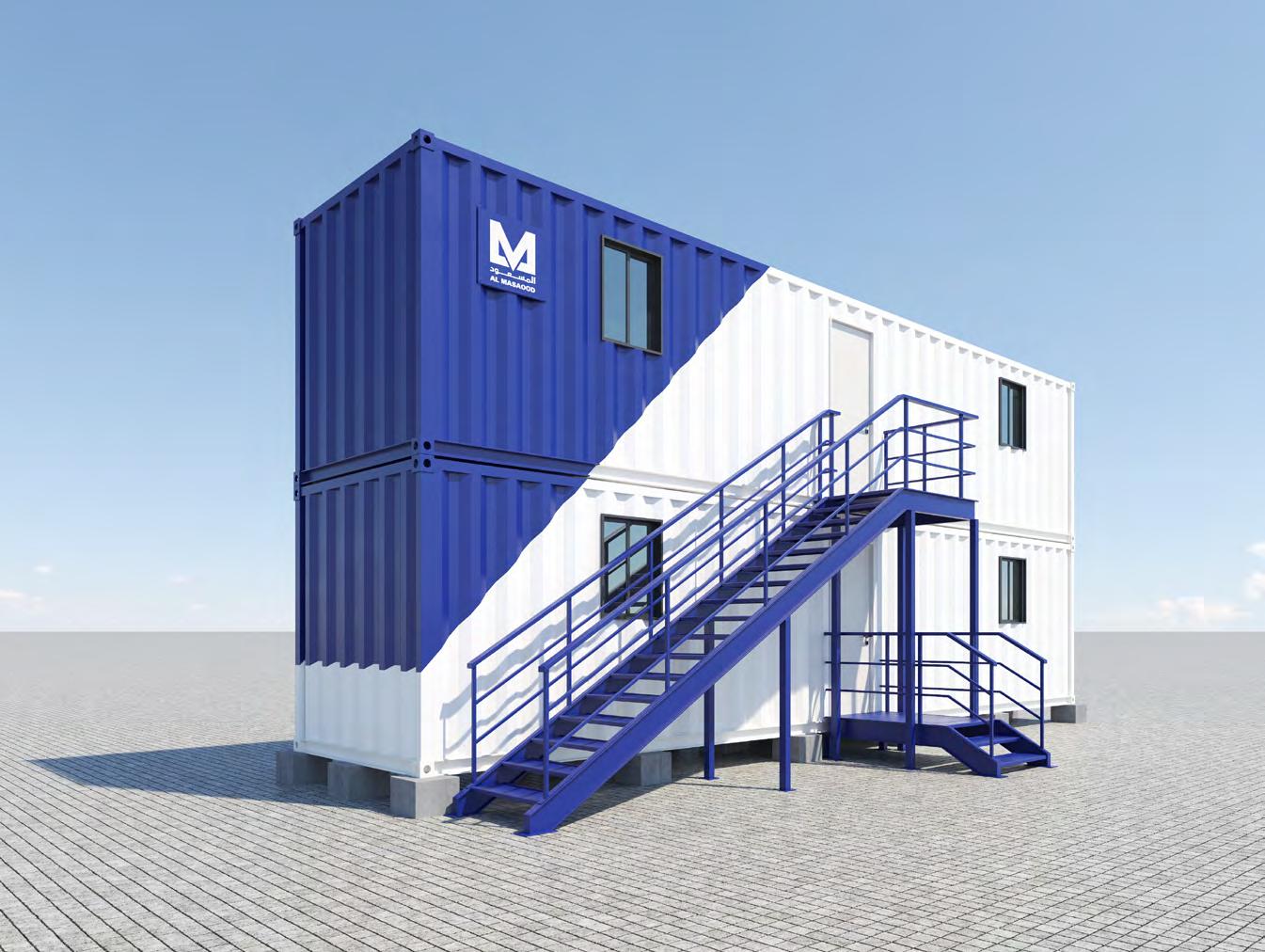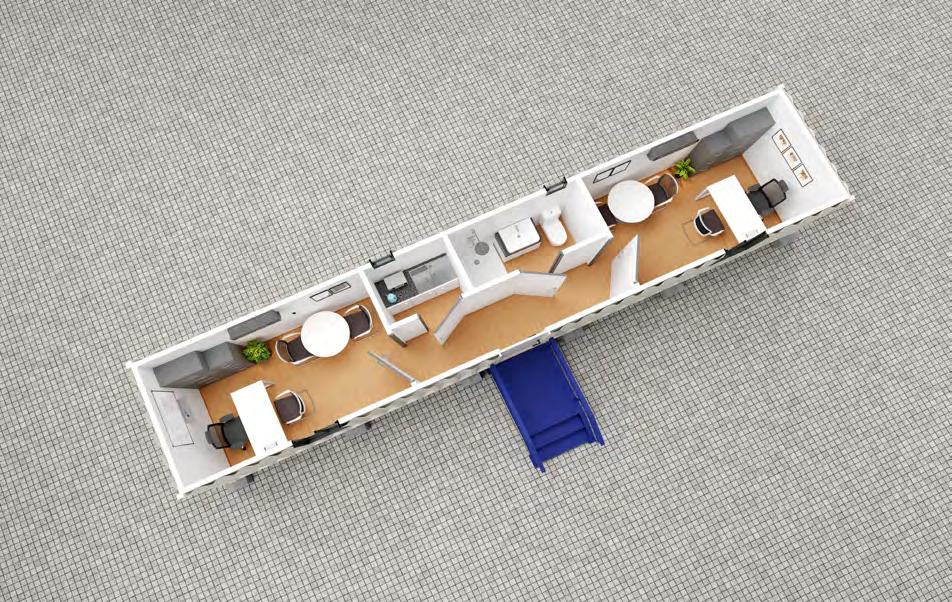LNME FORUM 2023
The Logistics News Middle East Forum provides a dynamic setting for fostering networking and discussion of logistics and supply chain trends.


The Logistics News Middle East Forum provides a dynamic setting for fostering networking and discussion of logistics and supply chain trends.

With a complete line-up of AWD and PWD versions and the the 16-speed HI-TRONIX automated gearbox, the IVECO T-WAY features a host of functionalities such as Rocking Mode, Off-road Mode, Creeping Mode and 4 reverse gears to tackle with ease the toughest off-road conditions. The new architecture of the EBS system, combined with disc brakes on all wheels, greatly improves the vehicle’s performance and the driver’s safety in the most demanding applications.
The new IVECO S-WAY, with a completely redesigned and reinforced cab, offers a wide choice of Euro III/V diesel engines, a delivering class-leading power from 360 HP to 560 HP Euro III / 570 HP Euro V and superior fuel-saving devices, such as anti-idling feature, Ecoswitch, Ecoroll and Smart Alternator, 12-speed HI-TRONIX automated transmission with the most advanced technology in its category, electronic clutch and best-in-class torque-to-weight ratio.

LNME FORUM 2023
LOGISTICS NEWS
MIDDLE EAST FORUM
PROVIDES A DYNAMIC SETTING FOR FOSTERING NETWORKING AND DISCUSSION OF LOGISTICS AND SUPPLY CHAIN TRENDS
16 OPED MANAGING THE LOGISTICS COMPLEXITIES OF SHORT SHELF-LIFE GOODS
Dr Shereen Nassar, global director of logistics studies and director of MSc Logistics and supply chain management suite at Heriot-Watt University Dubai, pens down her thoughts
18 ANALYSIS
ESG INVESTMENT
And how COP28 will impact regional sustainability trends
20 FORETHOUGHT DOMINO EFFECT
How incremental change can make waves for sustainable logistics in the Middle East

22 DATA
HOW TO BUILD SUPPLY CHAIN RESILIENCE THROUGH DATA?

Mohamed Zouari, General Manager at Snowflake Middle East, Turkey, and Africa, discusses with us the sheer pliability of data in the future of the supply chain
26 LAST MILE
THE EXCEPTIONAL REGIONAL EXTENSION
Vibha Mehta talks to Sean Xiao, CEO of J&T Express Middle East, to learn about the business’s progressive growth in the region
44 MARITIME
EVERYTHING YOU WANT TO KNOW ABOUT MARITIME TECHNOLOGY
Logistics News ME speaks with David Tyler, Commercial Director at Artemis Technologies, to learn more about Smart Shipping and Maritime Tech
46 E-COMMERCE
AMAZON MENA LAUNCH DXB5
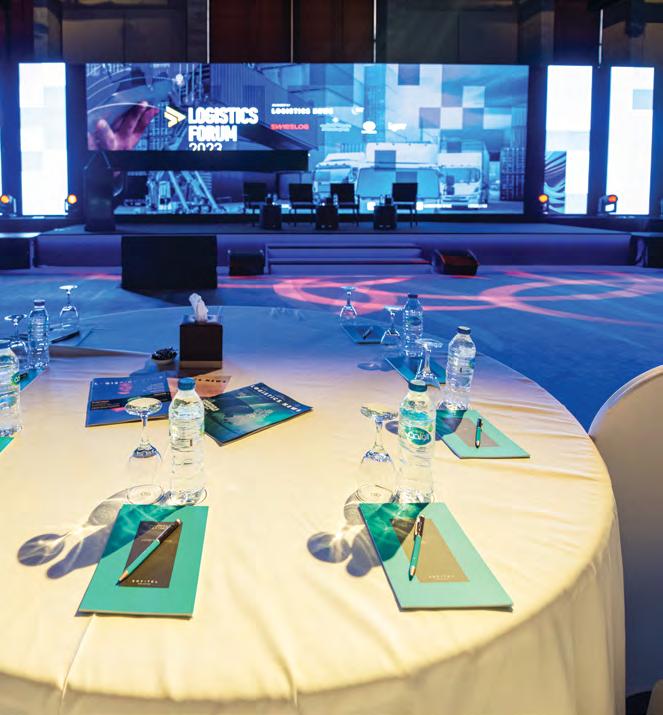
FULFILMENT CENTRE IN DUBAI
Vibha Mehta speaks with Prashant Saran, Director of Operations for Amazon MENA, to know more about Amazon’s increasing footprint in the region
50 HOSPITALITY
LOGISTICS IN HOSPITALITY
Richard Cowling, Director of Operations at Gates Hospitality shared with us about the essentials of logistics and supply chain



CEO
Wissam Younane wissam@bncpublishing.net
Director
Rabih Najm rabih@bncpublishing.net
Group Publishing Director
Joaquim D'Costa jo@bncpublishing.net
Managing Editor
Kasun Illankoon kasun@bncpublishing.net
Editor-in-Chief
Vibha Mehta vibha@bncpublishing.net
Editorial design
Christian Harb
Marketing Executive
Aaron Joshua Sinanbam aj@bncpublishing.net
Photographer
Alexander Bungas
Images used in Logistics News ME are credited when necessary. Attributed use of copyrighted images with permission. All images not credited courtesy Shutterstock.
cbnme.com
SUBSCRIBE
subscriptions@bncpublishing.net
PO Box 502511 Dubai, United Arab Emirates
P +971 4 4200 506 | F +971 4 4200 196
For all commercial enquiries, contact jo@bncpublishing.net T +971 50 440 2706

All rights reserved © 2023. Opinions expressed are solely those of the contributors. Logistics News ME and all subsidiary publications in the MENA region are officially licensed exclusively to BNC Publishing in the MENA region by Logistics News ME. No part of this magazine may be reproduced or transmitted in any form or by any means without written permission of the publisher.
Printed by United Printing and Publishing | upp.ae
In addition to our print edition, we’re bringing you all sorts of industry news on our web mediums. We’re looking forward to interacting with our readers on all of our social media and web platforms. See you on the web!
Logistics News ME @Logisticsnewsme
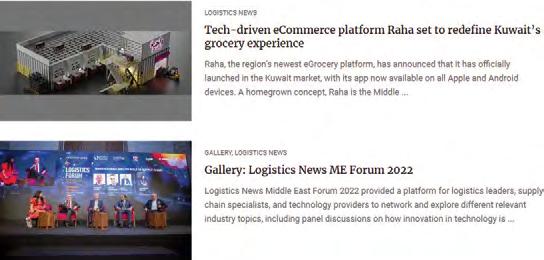

Logistics News ME logistcsnewsme

Regardless of whether it is a rigid chassis, concrete mixer or heavy-duty tipper: The Mercedes-Benz Arocs provides an especially robust, resilient vehicle that is optimally prepared for use for any construction haulage challenge. Configure it now to suit your requirements and those of your project.
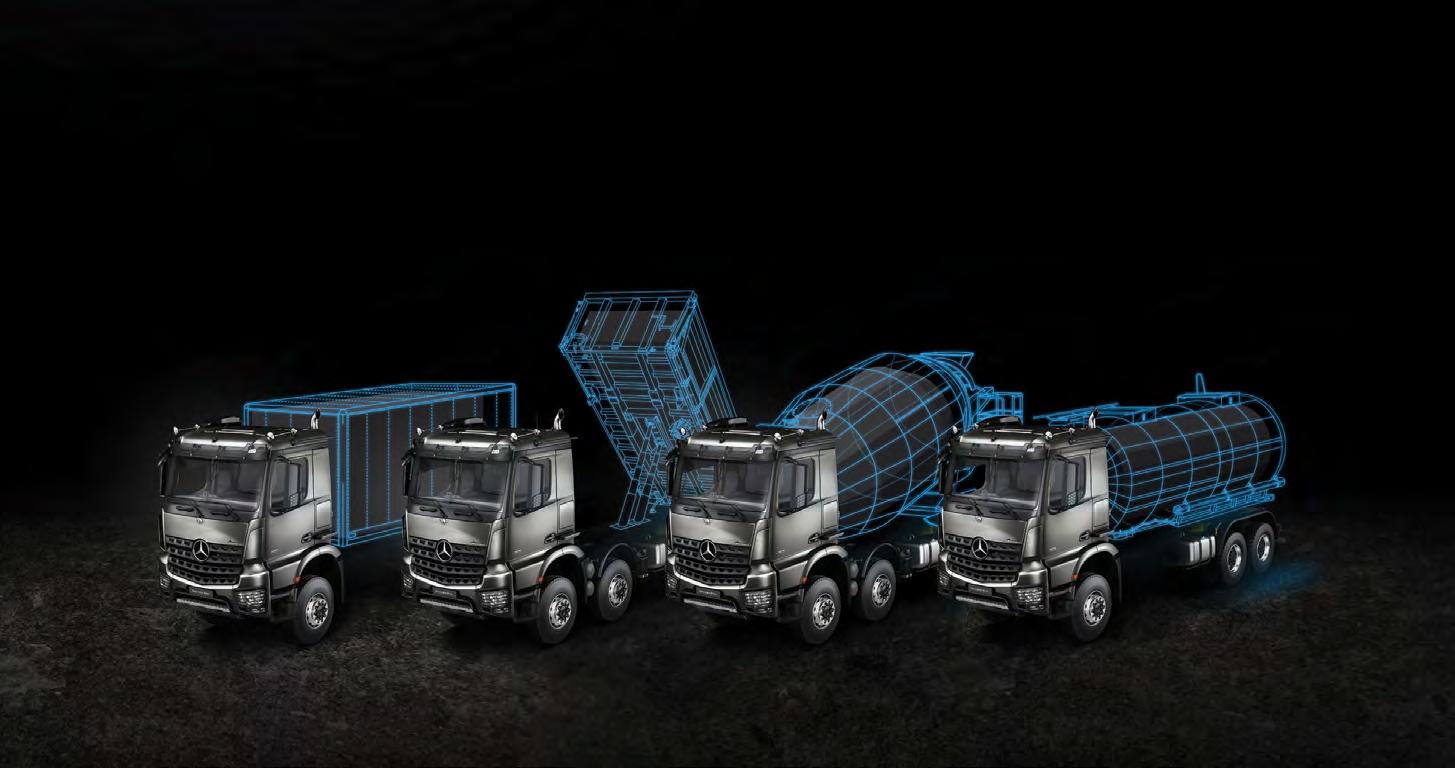
I would try to explain myself once or twice, but if they choose not to listen – I am happy to let them move on with their judgement, gladly accepting myself to be comfortable in my skin.
We, humans, are unique. Everyone has their whims and fancies. Not to judge here, but if you are comfortable, be satisfied with your set. My friends, or called family in Dubai, have always been the solid SUPPORT SYSTEM I could count on. They have always been there for me, from cheering on my big days to even sulking with me on the bad ones. To add some extra spotlight to my family and friends back home, you have been there for me throughout – those video calls do some magic, after all.
Thanking everyone in the professional space, my BNC team and the industry professionals who have known me since I started my journey; thank you!

This feature will cover my first-ever LNME Forum 2023, which I hosted last month, with some fantastic people sharing their insights, highlighting big industry hits and great conversations. And, of course, we are getting ready to go to Riyadh next month in May 2023, for something exciting! For more information, keep reading this space (online).
My parents have emphasised the value of surrounding myself with the 'right' people ever since childhood. At first, I assumed it was just so I wouldn't fall for the ruses, but with time, I realised that these individuals or rather 'your friends,' become an integral part of your life.
Over time, I have learnt to choose my set of people. Moreover, I have started letting go of people who still matter to me but who do not count on me. And thus, sometimes, you need to give up and move on. I have begun to let not people affect me. Given a chance,
 Vibha Mehta Editor-in-Chief vibha@bncpublishing.net
Vibha Mehta vibhamehta01 @vibhamehta01
Vibha Mehta Editor-in-Chief vibha@bncpublishing.net
Vibha Mehta vibhamehta01 @vibhamehta01
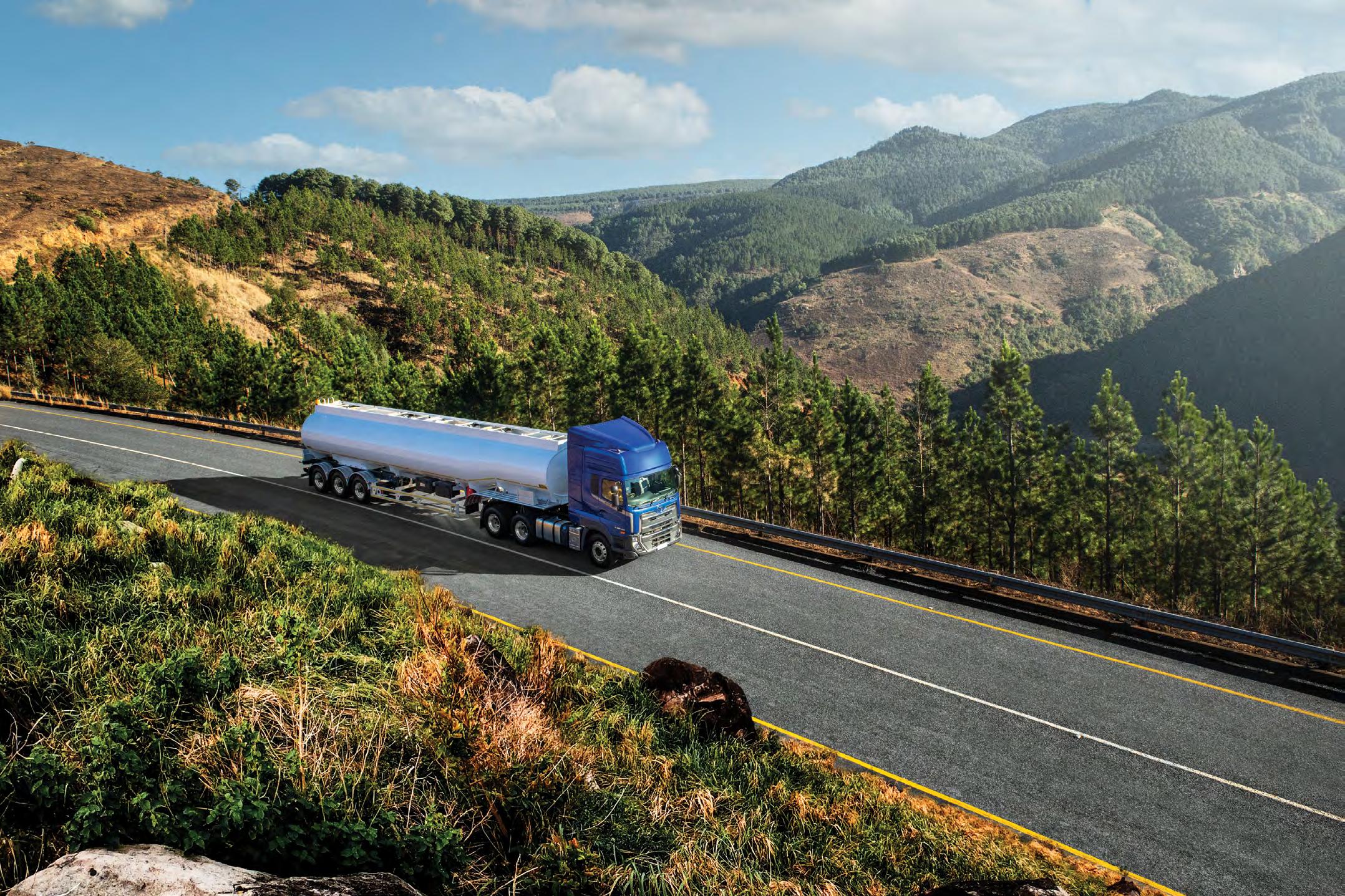











The Ninth Retail Leaders Circle MENA Conference lasted two days and was held in Riyadh on March 7 and 8, 2023. It was concluded after two days of open discussions on how the industry may grow in the future and better fulfil the changing demands of the region’s customers.
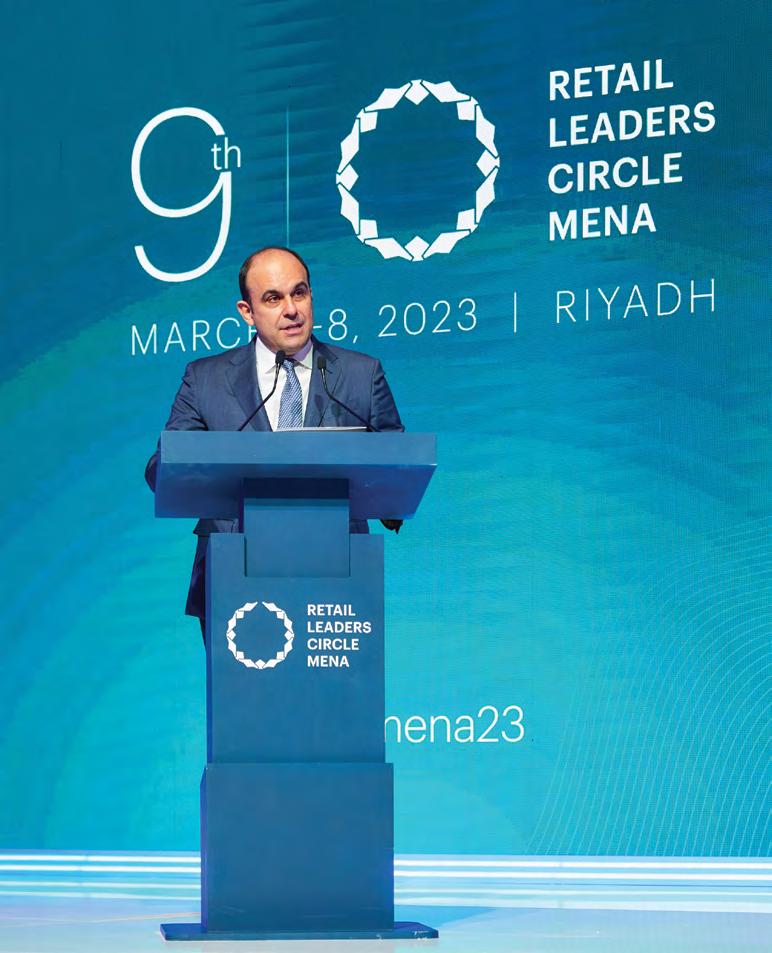
Strategic partners for the occasion were Cenomi Group and Saudi Payments. TikTok, Chahoub Group and Channels by STC were platinum partners.
Opening keynote speaker H.E. Eng Ammar Nagadi, Vice Minister of Economy & Planning, set the tone for the event – and laid out the Ministry’s strategic priorities for the sector. The Vice Minister put forth the Ministry’s expansion, modernisation and optimisation goal and said, “Our aim is to lead in the sector. To help shape the future of retail by harnessing the enormous potential of merging technologies and the retail metaverse. To transform Saudi into a regional hub for e-commerce, delivering on the promise of the digital ecosystem
through state-of-the-art logistics.”
The first day’s discussions centred on how the retail industry might most effectively use technology, especially immersive features like augmented reality, in their business strategies. The panels also addressed the impact of retail on other economic development sectors like tourism, entertainment, and new hotspots for a particular lifestyle. The heads of some of the most prominent retail organisations in the region participated in an unprecedented roundtable at the closing session.
Patrick Chalhoub Group, President of the Chalhoub Group; John Hadden, CEO of the Alshaya Group; Renuka Jagtiani, Chairwoman of the Landmark Group and Mohamad Mourad, CEO and Managing Director of Cenomi Group gathered to talk about how the industry should work together both within and with the government to promote change.
On the second day of the summit, they concentrated on how other industries, including tourism and emerging lifestyle destinations, might affect retail. Speakers also addressed the changing dynamics and increasing capabilities of the payments markets, as cash transactions fall below 50 per cent of total retail spend. The expanding Saudi fashion industry and the rise of intriguing homegrown labels were also on the agenda.
The event included an interactive hybrid room where partners, including Cenomi Group, Saud Payments, Visa, TikTok, Snap and the 100 Saudi Brands Initiative, exhibited their latest innovations and ambitions for the area.
“The Ninth Retail Leaders Circle MENA Summit has been an enormous success, bringing together the sector leaders and industry pioneers and emphasising the centrality of the Saudi Arabian market to the regional retail ecosystem,” added Panos Linardos, Chairman of the Retail Leaders Circle. “The level of attendance and the quality of the conversation was extraordinary. The Retail Leaders Circle remains passionate about facilitating ongoing engagement and strategic collaboration to drive positive change in this vital sector.”
Deliveroo and Deliverect hosted a panel discussion with Seham AlHusaini, General Manager of Deliveroo, Naji Haddad, MENA General Manager at Deliverect, and Abdulrahman Al Omar, Managing Partner at Thinnies, as part of their mission to illustrate advancements in the food industry and support regional restaurants.

The speakers spoke about the critical role technology plays in assisting local restaurants to optimise their delivery operations, maximise profitability in the delivery-only model, maintain customer loyalty in the digital food space, and predict food trends for 2023 during the course of the event.
Naji Haddad, MENA General Manager at Deliverect, said, “Now more than ever, restaurants are realising technology’s integral role in the food industry. We saw it before the pandemic when online delivery started increasing, and then the pandemic accelerated it tenfold. Most restaurants started adopting delivery, online ordering, and digital menus. While technology has already improved several aspects of the restaurant industry, much more must be done. The future of food
is digital, and technology will continue to be a key driver in achieving growth, profitability, and improving customer experience.”
Deliveroo supports thousands of restaurant partners and hundreds of thousands of consumers thanks to its dedication to improving its technology tools. By anticipating demand, optimising delivery, and enabling testing, analysis, and continuous improvement, Deliveroo’s technology aids partners in streamlining operations, managing companies more effectively, and offering a fantastic customer experience.
Seham AlHusaini, General Manager of Deliveroo, added, “As leaders in the food technology space, Deliveroo is proud to have spearheaded a variety of tools that have made life that much easier for restaurants, customers, and riders. With years of experience in the regional and international food industry, Deliveroo has long been at the forefront of digital food delivery, recognising food trends and paving new strategies to keep customers engaged. We look forward to surprising and inspiring customers to keep trying new foods while continuing to work with riders and res-
taurant partners that make Kuwait such an outstanding food hub.”
Deliverect is the backbone of digital food and aids businesses in connecting with their customers through online commerce. Deliverect has accomplished several milestones, including processing over 250 million orders, having a failure rate of less than 2%, and collaborating with more than 700 trustworthy online integration partners in more than 32,000 locations worldwide.
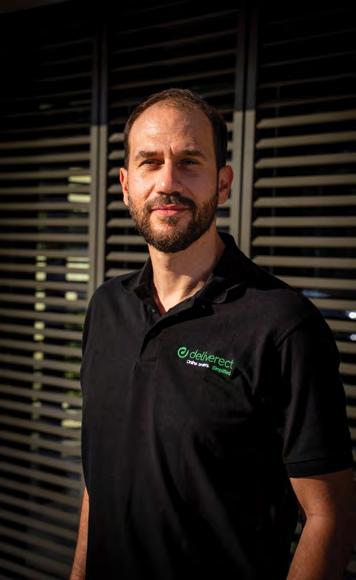
“AS LEADERS IN THE FOOD TECHNOLOGY SPACE, DELIVEROO IS PROUD TO HAVE SPEARHEADED A VARIETY OF TOOLS THAT HAVE MADE LIFE THAT MUCH EASIER FOR RESTAURANTS, CUSTOMERS, AND RIDERS.”
The third edition of EZDubai’s “E-commerce Report in the MENA region” was released in collaboration with Euromonitor International, the top global business intelligence provider, market analysis, and consumer insights. EZDubai is a fully dedicated e-commerce zone in Dubai South. The report revealed that the MENA region’s total e-commerce market reached US$37 billion in 2022, with a doubledigit growth rate from 2021 and a 32% CAGR over 2018 - 2022.

The MENA’s double-digit growth is due to robust internet usage, a well-developed infrastructure, and supportive policies. Several trends also contributed, including the increasing popularity of digital payment platforms, the rise of online grocery shopping, and expanding tech initiatives. Furthermore, economic stability, technology investment, and a young, tech-savvy population which has fueled the strong development of the digital landscape in the MENA region, as highlighted in the report.
The UAE, KSA, and Israel accounted for 72.1% of the total market size, with the growth in these countries attributed to factors including their technologically advanced populations, high-internet usage rates, and strong government finances. Specifically, Israel’s innovative economy and the rising demand for speedy delivery services propelled it to the forefront of the market. The report also notes that companies in the UAE use dark stores to streamline inventory management and provide delivery. Meanwhile, the KSA’s rapidly growing population, technological advancements, and development of secure payment systems contributed to its strong performance in the e-commerce sector.
The MENA e-commerce market is expected to reach US$57 billion in 2026, with a CAGR of 11% over 20222026. Although countries like the UAE, KSA and Israel are expected to remain leaders in e-commerce market share, countries like Algeria are expected to see strong growth.
In his comments, Mohsen Ahmad, CEO of Dubai South Logistics District, said, “The MENA region’s e-commerce industry has experienced rapid growth in recent years, driven by a combination of factors, such as increasing internet and mobile penetration, rising consumer demand for convenience and value, and the emergence of innovative business models. It is worth noting that government initiatives have also played a vital role in supporting this growth, with several regional governments implementing policies to support digital transformation and encourage entrepreneurship and investing in the necessary infrastructure and technology to facilitate e-commerce operations. At EZDubai, we recognise the strategic importance of e-commerce to the region’s economic development. We are committed to further working closely with the government sector and local and international businesses to support this dynamic industry’s growth and success.”
Engy Naguib, Senior Engagement Manager, Public Sector MENA region at Euromonitor International, added, “The demand for online shopping services in the MENA region is expected to continue growing. In particular, consumer electronics are expected to have a penetration rate of 29% for KSA and 50% in Egypt within total ecommerce by 2026. Meanwhile, the food and drink industry in the UAE is projected to experience strong growth, with penetration rates reaching 13% by 2026. Additionally, the KSA’s average order size is expected to increase by 50% in 2026. To sustain growth, E-commerce players should prioritise personalisation of the online experience, adopt an omnichannel approach, and improve last-mile delivery services.”
EZDubai was designed to attract leading e-commerce companies and create a benchmark with its infrastructure. The e-commerce zone, launched in January 2019 by HH Sheikh Mohammed bin Rashid Al Maktoum, Vice President and Prime Minister of the UAE and Ruler of Dubai, aims to promote the emirate’s position as a hub for regional e-commerce.
EZDUBAI
The Dubai Economic Agenda (D33), which aims to place Dubai among the top three global cities and double its economy in the following ten years, was discussed at the meeting of the Dubai Free Zones Council (DFZC), presided over by His Highness Sheikh Ahmed bin Saeed Al Maktoum, Chairman of the Council.
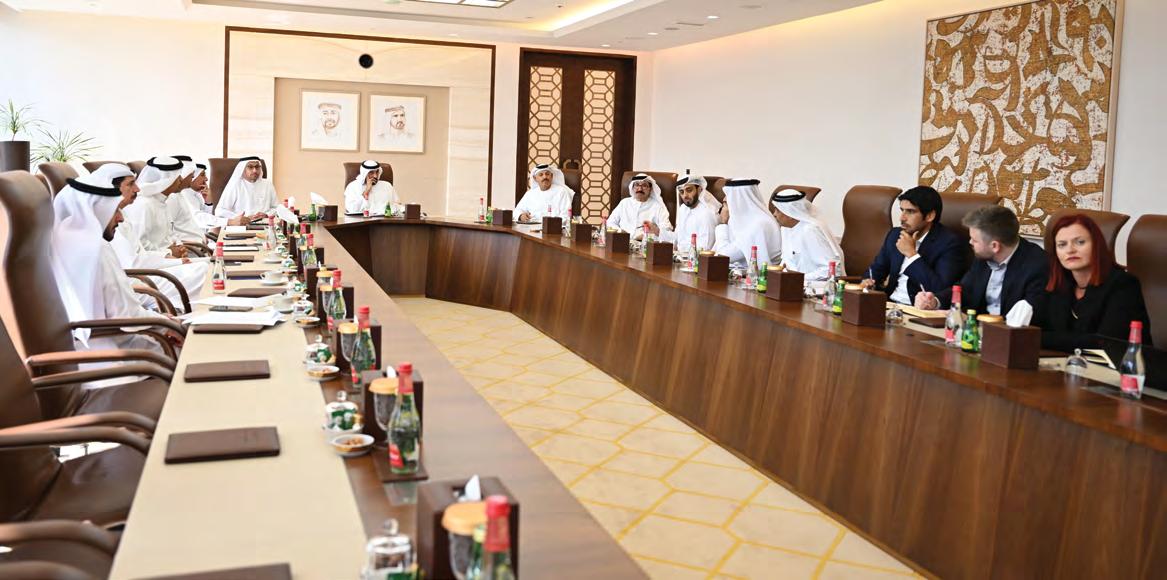
The Council confirmed its commitment to attaining the aims of D33 through many initiatives and addressed its plan of action in light of the UAE’s preparations to host the Conference of the Parties to the UN Framework Convention on Climate Change (COP 28) at the Dubai Expo City. This was done by detailing its packages that streamline services and improve the experience of international investors. The Council also emphasised the significance of working with the Emirati Human Resources Development Council in Dubai to encourage Emirati talent to work in free zone enterprises in Dubai and several other issues about the economic sectors in the free zones.
The Council discussed the results of the Free Zones Energy Demand Management Strategy, which aims to lower the demand for electricity and energy consumption by free zone businesses to achieve sustainability and help realise the vision of Dubai’s wise leadership to solidify its position as a global leader and create creative and environmentally friendly communities. In combination with the Year of Sustainability and preparations for hosting COP 28, this plan opens the path for advancing the goals of the UAE Net Zero strategic initiative, which aims to achieve climate neutrality by 2050.
The strategy aims to reduce demand for energy and water by 30% by 2030 for free zones and companies, in addition to providing added value to businesses. The strategy also describes how to collaborate with the relevant government organisations to lessen the carbon impact of free zones while introducing innovation, awareness technology, and procedures linked to energy demand reduction and sustainability.
The Council also explored a proposal to unify the title and classifications of services at Dubai free zones. This adheres to the Dubai Model’s philosophy, which provides packages that streamline benefits, improve service channels in free zones, satisfy client needs and expectations, and boost customer happiness.
The Council reviewed the efforts and successes accomplished over the previous period to explore the significance of luring Emirati talent to work in free zone enterprises in Dubai. It was also reaffirmed how important it is to maintain collaboration with free zone authorities to encourage their businesses to hire UAE citizens and use government capabilities and incentives like the Nafis programme. In order to achieve the best results and develop a new generation of Emirati talents in various industries within Dubai Free Zones, the Council emphasised the necessity of supporting these initiatives and collaborating with work teams and the Emirati Human Resources Development Council in Dubai.
DUBAI FREE ZONES COUNCIL SETS GREEN ECONOMY AS A KEY PRIORITY ON ITS AGENDA
Heriot-Watt
University Dubai, pens down her thoughts
The rise in urban population, evolving food consumption habits, and increased trade globalisation have complicated and prolonged food supply chains. To tackle the issue of food loss at every stage of the supply chain, there is a need to shift from a traditional approach to an integrated one. Implementing practical, affordable, and eco-friendly processing technologies, employing appropriate storage, and packaging solutions, enhancing road infrastructure and market linkages, as well as providing training and education to all participants in the supply chain, including customers, are some of the successful measures that can enhance the chain’s efficiency and decrease food waste and loss.
Dr Shereen Nassar, Global Director of Logistics Studies and Director of MSc Logistics and Supply Chain Management Suite at Heriot-Watt
University Dubai share insights on the complexities of managing logistics for perishable goods and the role of technology in better composing shelf-life food products.

The management of perishable products during shipping is a task that requires a higher level of precision than conventional retail supply chain management, as the products must be transported and stored in a strictly regulated environment. Perishable goods, such as food items, pharmaceuticals, and other temperature-sensitive products, have a limited shelf life and are highly susceptible to spoilage. According to a 2019 report by the Food and Agriculture Organisation of the United Nations (FAO), around 33 per cent of all food products, with an astonishing 45 per cent of fresh produce, are lost or wasted due to noncompliance with temperature limits during harvesting, packaging, transportation, or trade.
The challenges of managing perishable goods start at the source, where farmers and producers must ensure that their products are harvested, processed, and packaged correctly to preserve their quality. Once these products are ready for shipment, they must be transported to their destination quickly and efficiently while maintaining the optimal temperature and humidity conditions.
One of the biggest challenges in managing perishable goods is maintaining the cold chain, the temperature-controlled supply chain that ensures the quality and safety of perishable goods. It starts at the source, where the products are harvested or manufactured and continue through transportation, warehousing, and distribution. Any break in the cold chain can result in spoilage, leading to significant losses for the producer and supplier.
Managing the inventory is another critical challenge in handling perishable goods. Since these products have a limited shelf life, it is essential to address the inventory carefully to avoid overstocking or understocking. Overstocking can lead to spoilage while understocking can result in lost sales and dissatisfied customers. To manage the inventory effectively, companies must have accurate demand forecasting, efficient storage and retrieval systems, and effective monitoring of product expiry dates.
The increased use of technology in the food supply system has improved perishable food safety and quality. Different technolo-

gies can be integrated into the food supply system to mitigate risks, maximise efficiency, and manage complexities. Moreover, modern technologies have become more user-friendly and are used for different activities in the food supply chain, such as planting, harvesting, preparation, processing, packaging, transportation, and inventory management. RadioFrequency Identification (RFID) and smart labels have been considered easy methods for implementation in current packaging formats.
For instance, RFID (radiofrequency identification) tags can be used to track the location and temperature of products throughout the supply chain. This technology enables companies to monitor the product’s condition in real-time and quickly respond to any issues. Smart packaging is another significant advancement in the food production system, which helps maintain product quality throughout the supply chain and can extend the shelf life of perishable products.
Similarly, temperaturecontrolled containers, refrigerated trucks, and other
specialised equipment have made transporting and storing perishable goods easier. Furthermore, the data collected from these devices can be integrated into the company’s logistics management system to provide real-time visibility and transparency to stakeholders. This can help the logistics team to proactively identify potential issues and take preventative measures to avoid delays or damage to the perishable goods. The use of blockchain technology is another example of establishing a secure and transparent supply chain. With blockchain technology, it is possible to track the entire supply chain process, from the origin to the destination, guaranteeing that perishable goods are appropriately handled during transit. The technology offers an unalterable account of each stage in the supply chain, which includes recording the temperature and humidity levels during transportation and storage. Managing the logistics complexities of perishable goods requires careful planning, coordination, and execution. Companies must maintain the cold chain throughout the supply chain, manage the inventory effectively, and leverage technology to improve visibility and control over the process. By addressing these challenges, companies can ensure the quality and safety of their products, minimise losses, and increase customer satisfaction. Also, Innovation in the supply chain continues to develop as academics and scholars continuously study and evolve the processes based on the feedback received from the industry.


In recent years, the UAE’s commitment to accelerate its sustainability objectives from discussion to action has been highlighted through the laserfocused implementation of Environmental, Social and Governance (ESG) plans and policies by numerous public and private entities nationwide.
Having declared 2023 as the ‘Year of Sustainability’, the host nation of COP28 is escalating its efforts to lead global efforts on ESG education and benchmark the contribution levels expected from organisations across the Emirates. These latest moves are progressive and ambitious but follow a clear pattern.
In 2021, the UAE announced its Net Zero by 2050 initiative, making it the first country in the densely populated, carbon economyrich MENA region to pledge publicly. Last year, the Dubai Investment Fund launched an ESG Investment Department to monitor global and local markets to identify investment opportunities. Critical regulators, including Dubai Financial Services Authority (DFSA) and Abu Dhabi Global Market (ADGM), have continued maturing secure financial ecosystems with enforced sustainable
frameworks for organisations to prioritise sustainability and align their policies with social and community impact.
Now, with sustainable practices permeating multiple industries domestically and internationally, a rising trend of green stocks represents a massive opportunity for investors. Institutional investors are driving the sustainable market, but interest from millennials has been growing steadily, creating a domino effect that will make companies more purposedriven and improve their sustainable business objectives. In this landscape, it is vital to take a comprehensive view of potential ESG impacts and understand the longterm financial returns of the investment before determining whether to invest.
While the ESG data market is relatively nascent, there is no doubt the region’s transition towards it – a shift which comes despite the many regional nations’ historical dependence on carbon contributions to their economies and growth. Some key regional sustainability trends include financial entities promoting sustainable finance and encouraging stronger cooperation between the public and private sectors.
According to a Sustainable Future Study by Bloomberg
Media, renewables and clean energy lead the pack in terms of return on investment. However, businesses are now being encouraged to explore other avenues of investment that deliver a more integrated approach to sustainability.
While the UAE’s hosting of COP28 underlines its commitment to fight climate change, an investment
pledge of AED 600 billion investment by 2050 comes with its own set of challenges. As climate change intensifies each year, there is an urgent need to transform multiple industries to meet sustainable development targets, avoid greenwashing, and create transparent and pragmatic resolutions.
With COP28 fast approaching, there is increased emphasis on regional and global leaders putting monolithic political and economic differences aside to explore the role of technology and how it will support sustainable development and influence investment opportunities to address sustainable agriculture, greenhouse emissions, marine ecosystems and clean energy resources.
Institutional investors are driving the sustainable market, but interest from millennials has been growing steadily, creating a domino effect that will make companies more purpose-driven and improve their sustainable business objectives.
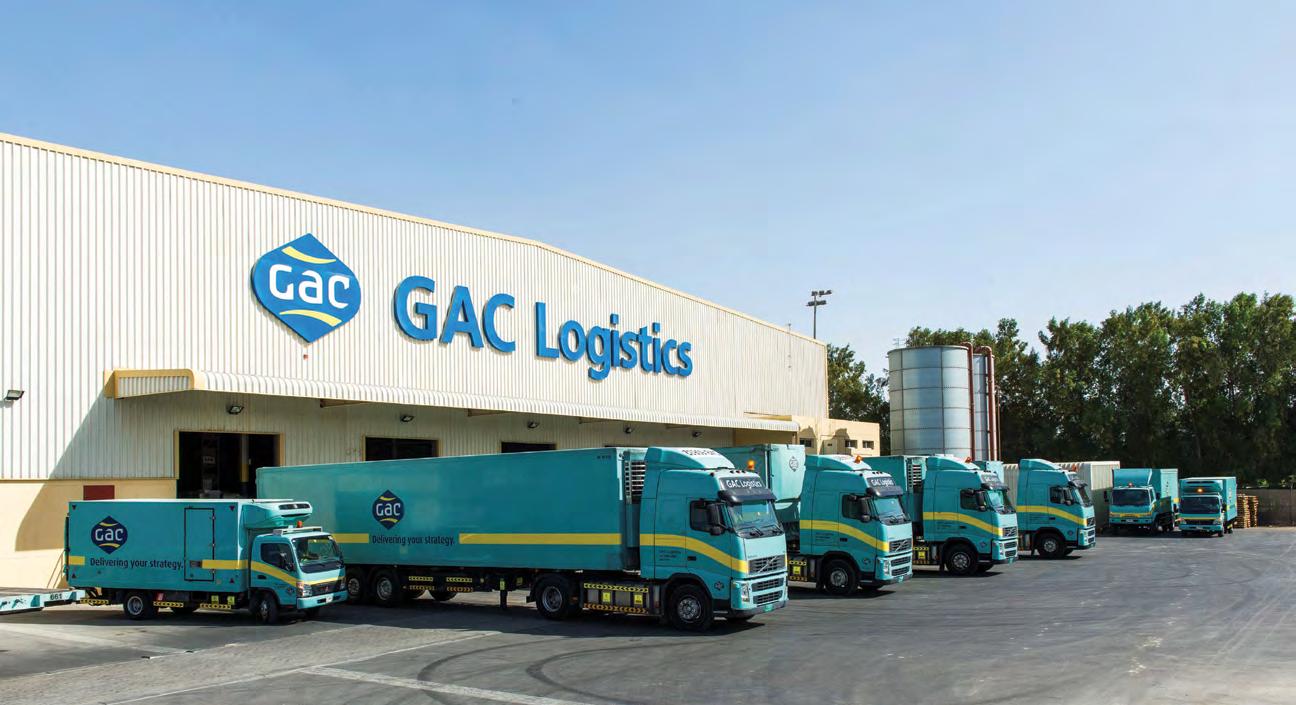
Fredrik Nystrom, Vice President at GAC Group Middle East, tells us why third-party logistics partners must invest in sustainable technologies
In January, Sheikh Mohamed Bin Zayed Al Nahyan, President of the United Arab Emirates, declared 2023 the ‘Year of Sustainability’: 12 months of initiatives, activities, and events to drive home the nation’s commitment to environmental and sustainable practices.
Similar initiatives have been seen throughout the Middle East in recent years. Sustainability remains
a foundation of Saudi Arabia’s and Bahrain’s Vision 2030 programmes. Qatar, buoyed by the successful sustainability strategy for the last year’s FIFA World Cup, continues to drive innovations in sustainable technology. And Oman will transition to a net-zero carbon economy by 2050.
The prosperity of the region was founded on its oil and gas reserves. However, in recent years the Middle
East has been looking to reduce its dependence on hydrocarbons by diversifying and working towards a future built on innovations, technology, renewable energy, and sustainability. Meanwhile, its role in the wider supply chain continues to expand. Home to key shipping routes such as the Suez Canal and the Strait of Hormuz, the region’s geographical position and world-leading logistics facilities, ports and airports are critical in connecting Asia and Europe. By nature, the global logistics and transport sector has a tremendous carbon output. According to a January 2023 report by the International Organisation for Standardisation, it contributes just over a third of global carbon emissions, the largest-emitting sector in many developed countries.
To meet global decarbonisation targets, every aspect of the logistics and supply chain industry must seriously review its carbon footprint. This means looking at warehouses and investing in digitalisation, automation and greener modes of transportation and freight methods.
That is precisely what GAC Group has been striving to achieve in its logistics operations. In 1993, it opened its first independent thirdparty distribution centre in Dubai. Located in the Jebel Ali Free Zone, the GAC Logistics Park has become a jewel in the company’s crown as one of the Middle East’s largest and most advanced centres.
Additionally, our facility in Dubai was a new concept for the Middle East at its launch. It was a bold step into the unknown but vital to tap into the potential of the region’s logistics market. We staked our claim to the Middle East market early and have continued to be one of the region’s leading players in contract logistics and warehousing. This is down to our drive to innovate, use technology to enhance our service offerings, and remain adaptable to ever-changing customer and market demands.

The development of the GAC Logistics Park laid the foundations for world-class warehousing and distribution capabilities to be replicated throughout the Middle East and beyond, in the Americas, Europe, Africa and Asia. In Dubai alone, GAC has five major distribution centres with a combined 116,000 m2 of facility space covering significant sectors, including fast-moving consumer goods, pharmaceuticals, fashion and automotive. To further expand its reach, the company opened dedicated contract logistics facilities with modern innovations and technology in Bahrain and Qatar, as well as in Indonesia, Malaysia, Singapore, Sri Lanka, and Thailand.
We have invested in digital platforms, including our bespoke warehouse management systems and advanced IT capabilities, to optimise operational efficiency while going paperless. We are committed to sustainability, and these investments enable us to stay on course. Apart from day-to-day operations, the buildings that comprise the region’s logistics landscape can become sustainable landmarks.
In December 2022, GAC Qatar opened its new 27,000 m2 multi-user contract logistics facility and office building in Ras Bufontas Free Zone featuring 40,000 pallet positions, temperature, and humidity-controlled chambers, dedicated valueadded services space and mezzanine storage.
Sustainable materials, methods and techniques were used in its construction. The building was given Global Sustainability Assessment System (GSAS) certification and boasts several energysaving features such as environmentally friendly controlled thermal insulation, thermal transmittance technology, advanced building management systems and LED lighting with motion sensors. Further, the facility is partly powered by solar energy and uses 100% recycled water from in-built storage building air coolers.
There are plans to further improve the facility with solar panels, a sanitary wastewater treatment plant for irrigation, and a plantation and irrigation system that requires low water consumption. GAC Qatar also invested in seven new fuel-efficient tractor heads last year to reduce its
carbon footprint and a project to recover and reuse 85% of the wastewater generated from container cleaning at its inland container depot.
The site draws on the Group’s experience from constructing other regional centres. In Dubai, GAC installed nearly 21,000 solar panels on the rooftops of three of its contract logistics facilities, which produce enough clean energy to meet up to 93% of the site’s total needs – the equivalent of powering 20,000 households.
It also recycles more than 37 million litres of wastewater annually through two sewerage treatment plants at its facilities and is on its way to replacing all its conventional vehicles with electric vehicles, with the first two launched in October last year.
Meanwhile, in Bahrain, GAC has installed 552 solar panels in its warehouse in Bahrain Investment Wharf in Al Hidd to generate approximately 300KW of
energy to fully cover its total electricity needs.
As the Middle East deepens its commitment to sustainability, technology and innovation –third-party logistics partners must also, capitalise on burgeoning opportunities and ensure their practices are on the same path.
That does not just mean building eco-friendly warehouses from the ground up. Investing in small-scale sustainable technologies and projects, such as in-built solar panels and advanced warehouse management systems can significantly impact the broader carbon footprint of the logistics sector.
At a time when becoming greener has never been more important, these types of investments are critical to long-term sustainable goals. As an old proverb says, ‘The best time to plant a tree was 20 years ago. The second-best time is now.’
Today’s supply chains are highly susceptible to disruption due to congested global transportation networks and just-in-time manufacturing techniques, and the last few years have provided a stark example of how flimsy they are.
The COVID-19 disruption had authentic effects on the world economy; it is estimated that $4 trillion in global revenue was lost due to the pandemic. The war in Ukraine is causing additional problems this year, such as rising freight costs and product shortages. How can manufacturers strengthen their supply chains’ resilience and expand their businesses despite the ongoing economic unrest? The key is data. For manufacturers, a data-driven approach can provide cleaner, more sustainable operations and agile responses in the face of disruption and customer demand.
“To achieve this, there are three key strategies manufacturers can adopt which will enable them to build their businesses even in turbulent economic times: improving supply chain resiliency, powering industry 4.0 analytics, and enhancing the customer experience while generating new revenue streams,” says Mohamed Zouari, General Manager at Snowflake Middle East, Turkey, and Africa.
All parties in the supply chain must communicate effectively with one another for a product to be manufactured and reach consumers, but this has become increasingly challenging in recent years. “Manufacturers can solve issues with data that identifies limitations in raw materials or provides customer and market characteristics. But this information frequently resides

not only on the manufacturer’s systems but also on those of the ecosystem of third parties it collaborates with, such as clients, suppliers, and logistics providers,” Mohamed adds. Gaining visibility and spotting opportunities for improvement requires collaboration with partners from across the ecosystem.
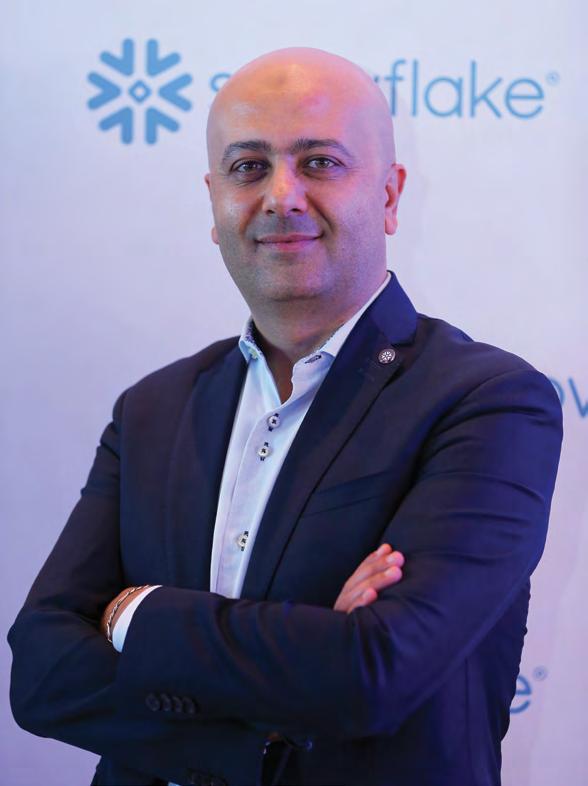
The difficulty lies in combining that data to produce a ‘big picture’ understanding of current events. Data must be accessible to allow analysis to spot supply chain risks and potential hiccups. Manufacturers must also securely and legally share data with partners externally. By doing this, data sets can be improved, providing a complete picture of the entire supply chain that keeps everyone up to date.
Once this end-to-end view has been established, analytical technologies such as Artificial Intelligence (AI) and Machine Learning (ML) can offer insights in the form of alerts, forecasts, and business intelligence recommendations. “Insights such as these give businesses the luxury of agility - the ability to proactively spot a problem or predict an outcome and act on these insights quickly, based on an understanding of the real-time situation. If manufacturers identify an issue, they can alter their plans. For example, switching suppliers or using another material and being able to inform partners of any changes that might affect them,” states Mohamed.
Regarding developing technologies, manufacturers also have numerous chances to use data to take advantage of ‘Industry 4.0’
opportunities, improve their intelligence, and adopt more sustainable practices. The Industrial Internet of Things (IIoT) is critical to this, with intelligent sensors from factory equipment, robotics, handheld devices, and wearable technology providing a flood of data that, when combined and analysed, can significantly improve production processes’ efficiency and quality.
For far too many manufacturers, this data still needs to be locked away in disparate systems like shop floor systems like Historians, MES, QM, control systems, supply chain management platforms, and ERP (enterprise resource planning) platforms. “Once combined, this data can be used to perform many tasks, such as predictive maintenance.” This involves taking data from equipment used to predict how it might perform, for example, when machinery breakdown is imminent or a building’s energy use, to formulate plans that take advantage of the correct type of energy at the right cost, to help organisations hit their environmental goals. “Which will be a priority as we enter the new year, with almost half of the British manufacturers (49%) planning to invest in green technologies for energyefficiency measures over the next 12 months.”
Smart, connected products allow manufacturers to use IoT data to improve the customer experience both during production and after. These products continue to report back to the manufacturer after being used by the customer, giving the manufacturer a chance to offer distinctive sales
and services or create entirely new business models.
“These advantages are only possible if the data they produce is gathered, examined, and used immediately.
For instance, performance management, most frequently related to expensive industrial machinery, allows manufacturers to introduce ‘outcome-based services,’ where customers are charged based on increased uptime or better output quality.”
Additionally, this information allows manufacturers to introduce equipment-asa-service (EaaS) offerings, where customers can purchase equipment as needed and pay in related ways.
Similar to smart field services, which rely on information gathered from defective products, these services give service technicians a general idea of the problem and the tools and parts they will need
before they even reach the customer’s site. The process’ effectiveness lowers costs and significantly enhances the customer experience.
There is no getting around the fact that manufacturers are dealing with a challenging economic environment and will continue to deal with several difficulties in the future. “Manufacturers can weather the storm and expand their businesses, despite what this might imply. All the data at their disposal, from pointof-sale terminals in stores to sensors on forklifts - it all holds value - will be essential to achieving this. Manufacturers will increase their resilience, enhance customer experience, and discover new revenue streams by utilising the data and sharing it with ecosystem partners,” concludes Mohamed.
The Department of Health Abu Dhabi (DoH), Pure Heath and its subsidiary Rafed have joined the National In-Country Value (ICV) program, one of the UAE’s Projects of the 50, following the signing of a memorandum of understanding with the Ministry of Industry and Advanced Technology (MoIAT).
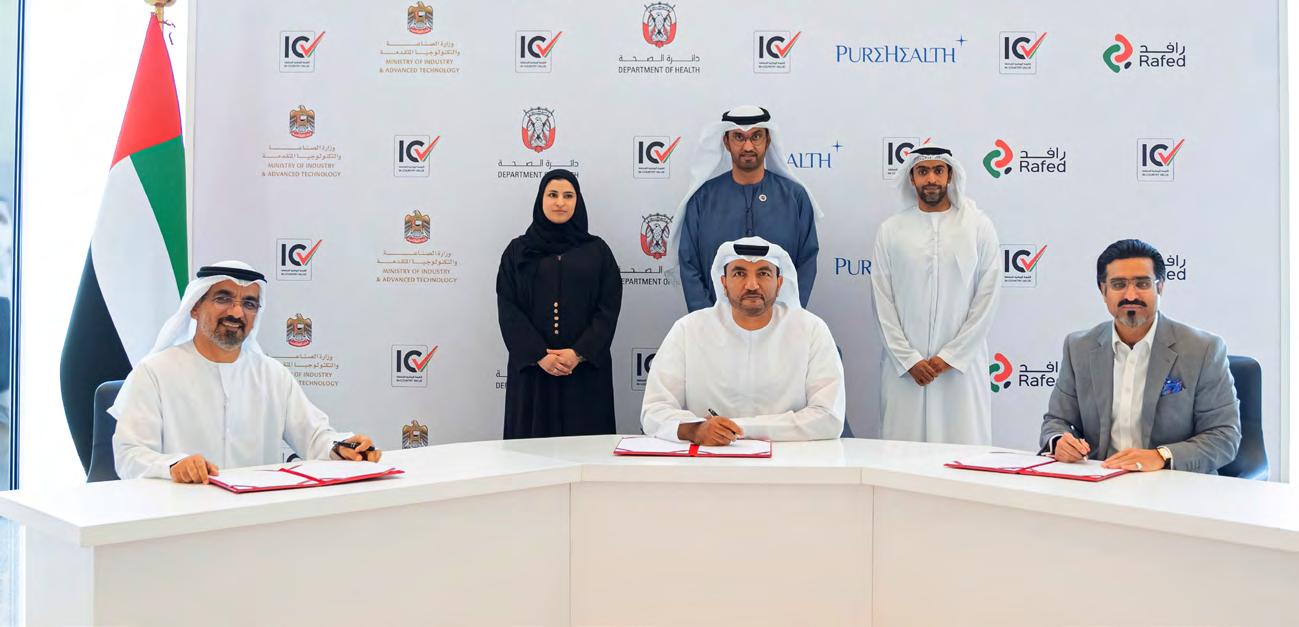
The MoU was signed by HE Dr Sultan Ahmed Al Jaber, Minister of Industry and Advanced Technology, HE Sarah bint Yousef Al Amiri, Minister of State for Public Education and Advanced Technology, and HE Mansoor Ibrahim Al Mansoori, Chairman of the Department of Health Abu Dhabi.
The three entities’ enrollment in the National ICV program incentivizes ICV-certified companies, increasing the demand for local products and services and redirecting higher portions of public and private spending to the national economy. This contributes to the growth of the industrial sector and the creation of quality job opportunities.
The MoU was signed by HE Omar Al Suwaidi, Undersecretary of the Ministry of Industry and Advanced Technology, HE Dr Jamal Mohammad Al Kaabi, Undersecretary of the Department of Health Abu Dhabi, and Farhan Malik, CEO of Pure Health, on behalf of Pure Health and Rafed.
HE Omar Al Suwaidi said, “As part of the Projects of the 50 and under the National Strategy for Industry and Advanced Technology, the National ICV program has had tangible benefits through enhancing integration between the ministry, federal and local authorities to stimulate entrepreneurship and innovation within companies, including startups and SMEs.
“The companies enrolled on the National ICV program injected AED 53 billion into the national economy in 2022. The program aims to empower the industrial sector, improve its performance, and ensure its sustainability by increasing the In-Country Value of national industries and services and redirecting public and private spending into the national economy.”
His Excellency added, “We use a specific methodology to empower the industrial sector, support national industries, stimulate investments, and enhance the industrial sector’s contribution to GDP. In doing so, we contribute to the objectives of the UAE to become a global industrial hub that attracts capital and invests in the industries of the future as well as develops industries based on technology
and 4IR solutions in line with UAE’s efforts to achieve net-zero emissions across all industries by 2050. Alongside initiatives, such as “Make it in the Emirates”, the National ICV program, the Technological Transformation Program and UAE Industry 4.0 play a fundamental role in supporting the growth and competitiveness of national industries.”
Under the MoU, the Department of Health Abu Dhabi, Rafed and Pure Health will cooperate in implementing the program according to the standards set by MoIAT. This partnership will support the resilience of local supply chains and motivate national companies to enter new partnerships to manufacture quality and globally competitive products. It will also contribute to integrating supply chains, enhancing self-sufficiency and boosting pharmaceutical
and medical supply competitiveness.
Commenting on the occasion, H.E Dr Jamal Mohammed Al Kaabi, Undersecretary of the Department of Health Abu Dhabi, stated, “Under the directives of the UAE’s wise leadership, we are pleased to be joining the ICV program, in a step that aligns with DoH’s strategy and our relentless efforts to reinforce Abu Dhabi’s position as a leading destination for healthcare, capable of providing a competitive edge for investors and entrepreneurs. As the Emirate’s healthcare regulator, we strive to support our national industry and strengthen the healthcare sector and its services. By joining the ICV program, DoH will support the UAE’s investments in a value-added economy and a sustainable healthcare sector while ensuring the creation of new job opportunities for local talents, thus
benefiting the members of our community in Abu Dhabi and the UAE. With the end goal of contributing to developing our national economy, we remain focused on cooperating with local and international partners, elevating our research capabilities and empowering our workforce.”
Farhan Malik, Managing Director and CEO of PureHealth Group stated, “As the UAE’s largest healthcare group, PureHealth is committed to not only elevating the healthcare landscape in the country but also supporting the growth of the UAE’s industrial sector, developing local capabilities, and boosting the In-Country Value to ensure a sustainable future to achieve the future industrial vision. PureHealth, and its subsidiary Rafed, are privileged to sign the MoU with the Ministry of Industry and Advanced Technology on furthering the ICV agenda, which will help build a sustainable and prosperous
future for the UAE.”
Farhan added, “Over the years, PureHealth has closely collaborated with MoIAT, and we are thankful to the ministry for facilitating the platforms and initiatives for companies to create synergies that support the UAE’s national industrial agenda. PureHealth has also committed AED 10 billion in the next ten years towards local procurement to boost local industrial production in the country.”
The National In-Country Value Program
The MoU aligns with the ministry’s strategic objectives to support the UAE’s industrial sector and national economy. It aims to expand the implementation of the National ICV program to include all sectors at the federal and local levels.
The National ICV program redirected more than AED 53 billion into the national economy in 2022, a year-onyear increase of 25%.
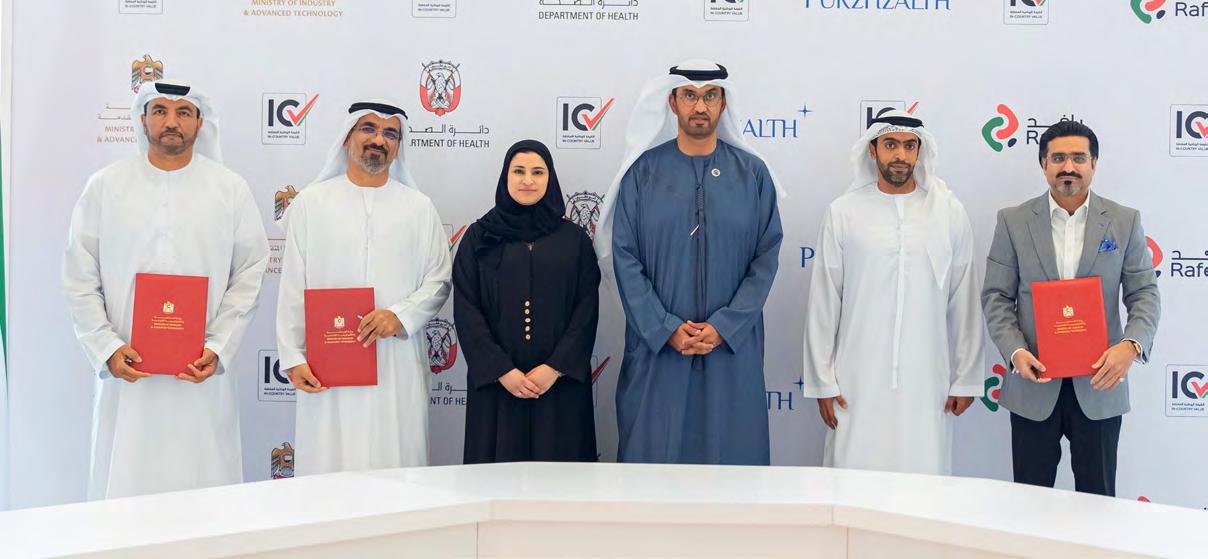
China-based J&T Express, one of leading Asia’s most prominent multinational logistics companies, is expanding its clientele throughout the Middle East, and how! J&T Express Middle East has more exciting plans for the area in the coming years after its formal launch in the Dubai market in 2021.

Here is everything you want to know about the company’s profitable operations and future growth goals…
As they continue to connect the MENA region with China and other markets while fostering logistics innovation and sustainable development, J&T Express Middle East has been rapidly growing its operations in the region and establishing itself as a deeply rooted business within the fabric of the communities. The MENA headquarters are based in Riyadh, Saudi Arabia, supported by a substantial presence in the UAE.
“I am proud of the great strides we have made since inception in the region and of the exceptional, trusted and
quality services and solutions we are offering,” says Sean Xiao, CEO of J&T Express Middle East.
Their customers in the Middle East benefit from their all-inclusive integrated services. Their last-mile delivery service concentrates on delivering the products to their destination, while their international freight service guarantees that commodities are delivered across borders securely and effectively.
“We have achieved exceptional growth and a strong foothold in the region, which aligns with our global strategy grounded with long-term and steady expansion and growth,” adds Sean.
The J&T Express Middle East family is likewise gradually expanding. They now have offices in Saudi Arabia with 3,000 personnel, seven branches that serve every city in the country, 1,600 delivery trucks, seven sorting facilities, and 49 courier depots. The company also has offices in
the UAE with 800 staff, 500 vehicles, three sorting facilities, and 14 courier depots.
Express Middle East
J&T Express Middle East offers several distinct features for express delivery in the region:
> Broad Coverage: J&T Middle East covers the major cities and the outlying regions of the Kingdom and the Emirates. J&T Express Middle East is solidifying its reputation as a locally based company that values its clients and gives back to the community while providing top-notch services and comprehensive coverage.
> Real-Time Tracking: J&T Express Middle East provides clients with real-time package tracking, allowing them to follow the movement of their shipment from pickup to delivery. Customers may prepare for the delivery of their items thanks to this function, which gives them peace of mind.
> Cash On Delivery: J&T Express Middle East allows clients to pay for their packages in cash at the time of delivery. This feature offers simplicity and flexibility for consumers needing access to online payment options.
> Competitive Pricing: J&T Express Middle East provides express delivery services at a competitive price, allowing consumers to send products at a reasonable cost while still enjoying prompt and dependable service.
“All these qualities ensure that our customers enjoy our fast, reliable, and convenient express delivery services in the Middle East,” states Sean.
Globally renowned players with decades of regional
presence dominated the Middle Eastern market. However, their highly replicable successful business model allowed
J&T Express Middle East to expand its operations rapidly throughout the region while also forging strong partnerships and relationships with critical governments and businesses.
“We play to our strengths, and our commitment to customer service remains unwavering. We have established a presence in the Middle East market by leveraging our expertise in e-commerce logistics and providing customers with costeffective services,” claims Sean.
J&T Express has also invested in infrastructure and technology to raise the calibre of its services and broaden its regional reach.
“J&T Express has contributed significantly to the expansion of e-commerce in the Middle East, and we have assisted the region’s e-commerce companies by enhancing logistics and delivery services. We provide a unique range of services, including last-mile delivery, cross-border shipping, and warehousing, which has streamlined the e-commerce supply chain and enhanced the consumer experience,” says Sean.
They have worked closely with nearby e-commerce companies to offer specialised logistics solutions that satisfy their needs. Its biggest local client is Noon, the most significant regional e-commerce company.
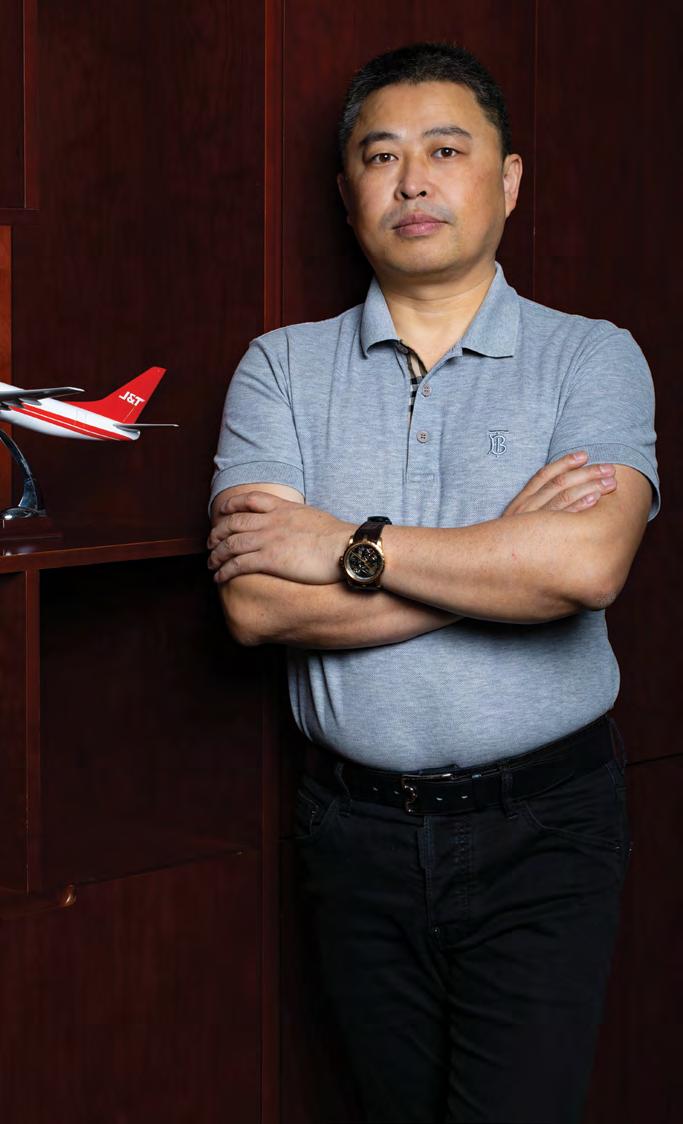
Similar to its international branches, J&T Express Middle East offers real-time delivery tracking services powered by
cutting-edge Technological infrastructure. Customers may follow the status of their shipments in real time by entering their order number or the recipient’s phone number; it is user-friendly and straightforward to browse. Customers have access to a thorough history to manage their orders quickly. This has improved delivery process clarity and confidence, making J&T Express a well-liked option for consumers and corporations.
The J&T Express tracking system is multilingual and covers languages including English, Arabic, Chinese, etc. It is compatible with PC and mobile platforms. Clients may receive SMS notifications on the arrival of their shipments, and if they need any more information, J&T Express customer care representatives are available to help immediately by phone, email, or online chat.
THE EXCEPTIONAL REGIONAL EXTENSION | SEAN XIAO, CEO OF J&T EXPRESS MIDDLE EASTSean claims that because it can be easily linked with their platforms, it is simple to handle their shipments and track orders inside their existing systems, “Our tracking software is built to service our vast e-commerce customers. Customers will have a smooth experience thanks to the software’s customisable tracking pages that can be branded with the e-commerce company’s logo and colours.
“The software tracking system is not only a crucial instrument for assisting us in providing our clients with dependable and effective logistics services, but it also helps us optimise our cross-border IT infrastructure and enhance our customer service offerings.”
Sean explains, “Our staff throughout the area has worked extremely hard to negotiate the particular operating environment in the Middle East and adapt to the particular requirements while preserving customer happiness and the quality of our services at the forefront of all considerations.” They have highlighted two major issues that
they feel are confronting all worldwide participants in the sector:
The Payment System: Due to the low adoption of online payment systems, one must change how they do business to accommodate cash and credit cards as the preferred payment methods. Because of this, J&T Express Middle East offers cash-on-delivery services, allowing clients to pay for their packages conveniently and flexibly at delivery time.
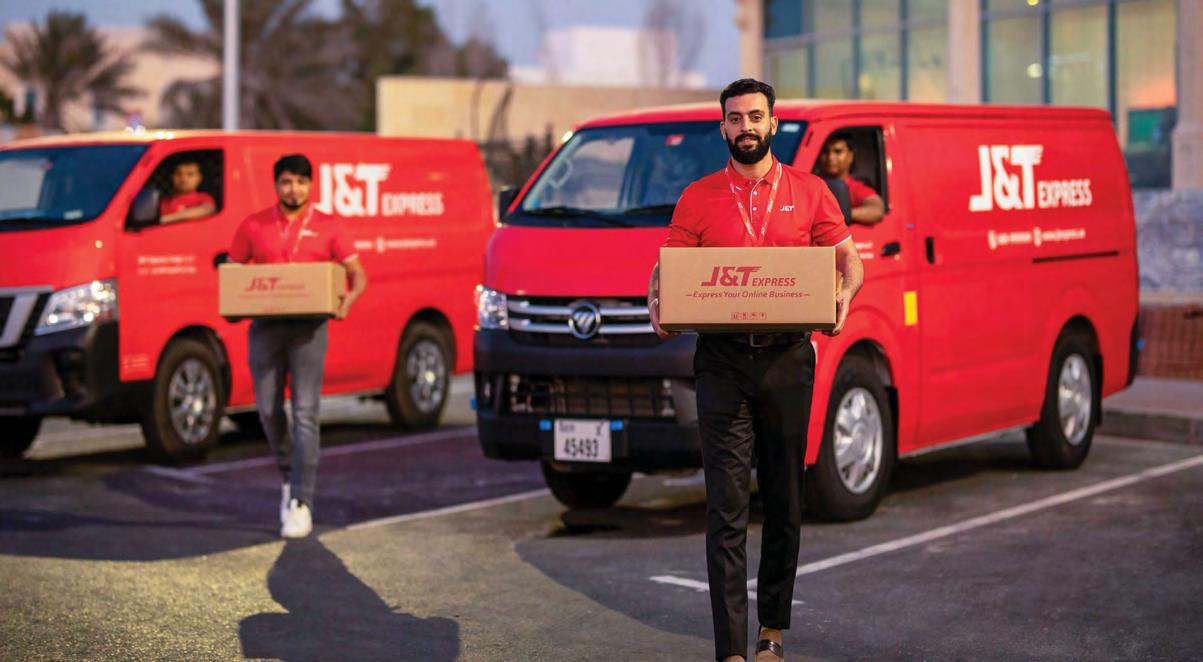
Workforce and talent:
Recruiting the proper individuals for our quickly growing company is always challenging, particularly in a region with as intense competition as the Middle East. In such a short period, we have developed a strong, cohesive, and diversified team, which continues to expand impressively, continues Sean.
Customers in the Middle East have consistent concerns across the board due to their constantly changing demands and requirements:
> Safety and Reliability: Consumers anticipate receiving their purchases on schedule and in good shape, and any delays or damage can significantly affect their company operations. This includes safety precautions, GPS tracking, secure packing, and safe storage and delivery techniques.
> Cost: Consumers desire affordable, trustworthy services. As the industry gets more competitive, customers are searching for logistics suppliers offering top-notch services at reasonable pricing. > Customary Rules: Consumers want to be confident that these rules are followed when handling their items. This entails having the appropriate paperwork, adhering to import and export regulations, and following clearance processes.
As we all experienced during the Covid-19 outbreak, the fear of a worldwide logistical standstill is another major concern we have observed in the area and throughout the world. Because of this, J&T Express Middle East has constructed sizable warehouses and sorting facilities locally as a part of the solution.
These facilities help to cut down on transportation times, enhance inventory management, tighten control over supply risk, and ultimately improve the overall quality of our services and give our clients peace of mind.
“I think J&T Express Middle East is in a good position to convert problems and worries into chances for development and achievement. Because of our extensive expertise and proven track record of success in attaining rapid development in several
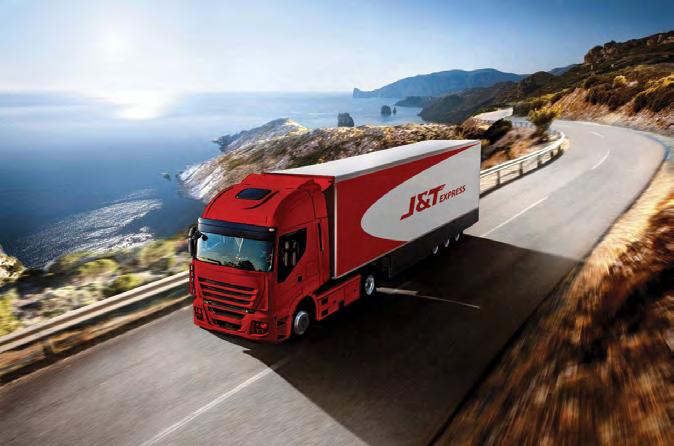
areas worldwide, we have a competitive advantage,” shares Sean.
Adapting Automation “We have always believed that technology will bring substantial advantages, such as improvement in efficiency and productivity. Globally we are always exploring new and multifaceted approaches to automation as part of our strong initiatives to increase efficiency, reduce costs, and provide a better customer experience,” maintains Sean.
> Automated Sorting and Picking: J&T Express uses
automatic sorting and picking technologies to handle high shipments efficiently and correctly. Compared to manual labour, computerised systems can sort and choose items more quickly and precisely, which improves packaging efficiency, lowers mistake rates, and accelerates delivery times.
> Automated Warehouse Management: J&T Express uses a computerised warehouse management system to streamline its internal warehouse operations. Inventory management, shelf layout optimisation, and inventory turnover are all facilitated by technology. Also, it lessens the need for manual intervention, which boosts productivity while lowering the likelihood of a human mistake.
> Automated Tracking and Notification: To improve the client experience, J&T

Express offers an automated tracking and notification system. Customers are informed of the status of their orders through automated order status updates and SMS notifications of order arrival sent by the system.
> Automated Data Analysis: J&T Express uses an automated data analysis system to improve its operational methods. To give accurate market projections and consumer demand analysis, the system analyses order data, logistical data, and user input. This helps J&T Express make better business decisions.
“Lastly, increased speed and accuracy, cost savings, improved customer experience, greater scalability, and improved safety are currently the key areas where automation has played a key role in streamlining processes and increasing efficiency for us,” concludes Sean.
“WE HAVE ACHIEVED EXCEPTIONAL GROWTH AND A STRONG FOOTHOLD IN THE REGION, WHICH ALIGNS WITH OUR GLOBAL STRATEGY GROUNDED WITH LONG-TERM AND STEADY EXPANSION AND GROWTH.”
The Logistics News Middle East Forum provides a dynamic setting for fostering networking and discussion of logistics and supply chain trends. During this year’s LNME Forum 2023, industry experts shared their perspectives on crucial issues and trends, including Automation, Logistics and Supply Chain in F&B, Mile Delivery, and Disruption in the Aviation Industry.
The LNME FORUM 2023 took place at the Sofitel The Palm on March 20, 2023.

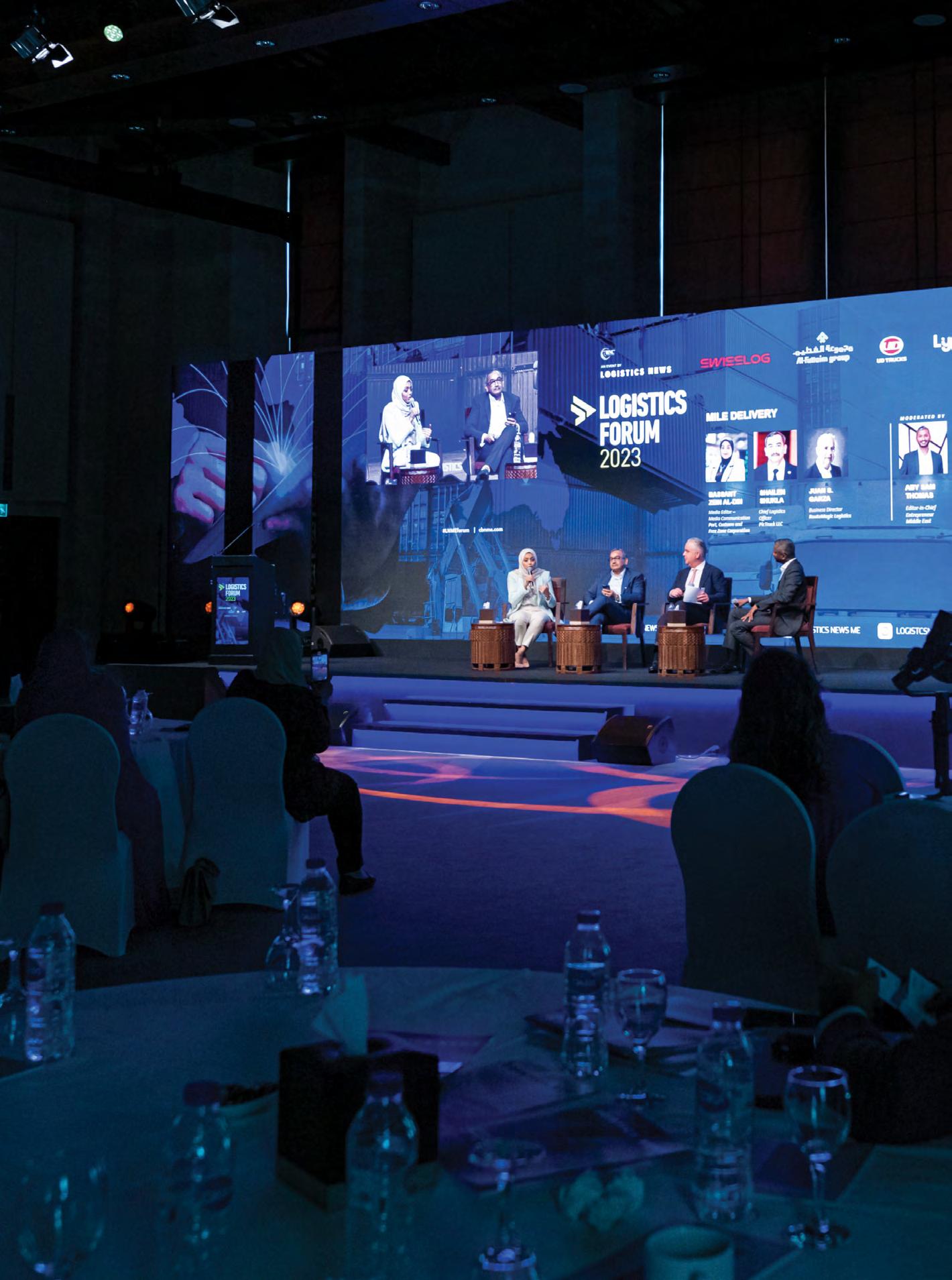
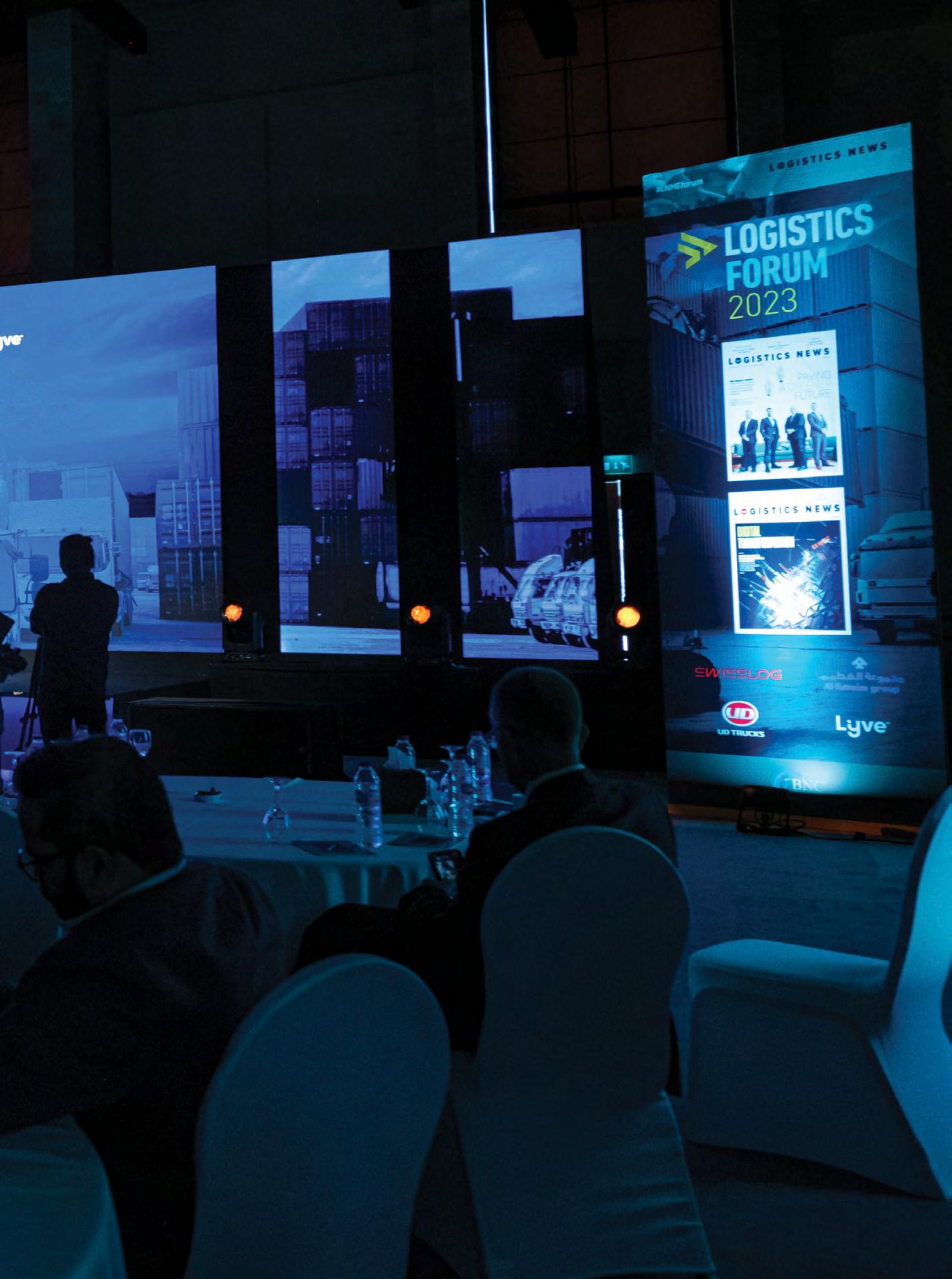
Almost every industry you can think of is evolving in terms of automation. The first panel at the LNME FORUM 2023 discussed how different automation developments affect businesses in the logistics sector. Majda Rochdi highlighted how the trucking sector is reacting to this new development, while David Dronfield spoke about how companies should concentrate on technology that is more relevant to them than the others that are now available on the market. Alain Kaddoum discussed advancements in warehouse technology simultaneously, while Marwa Kaabour served as the ideal moderator, guiding the discussion by bringing her book Marketing Communications At Work as an example and her experience at Al Masaood.
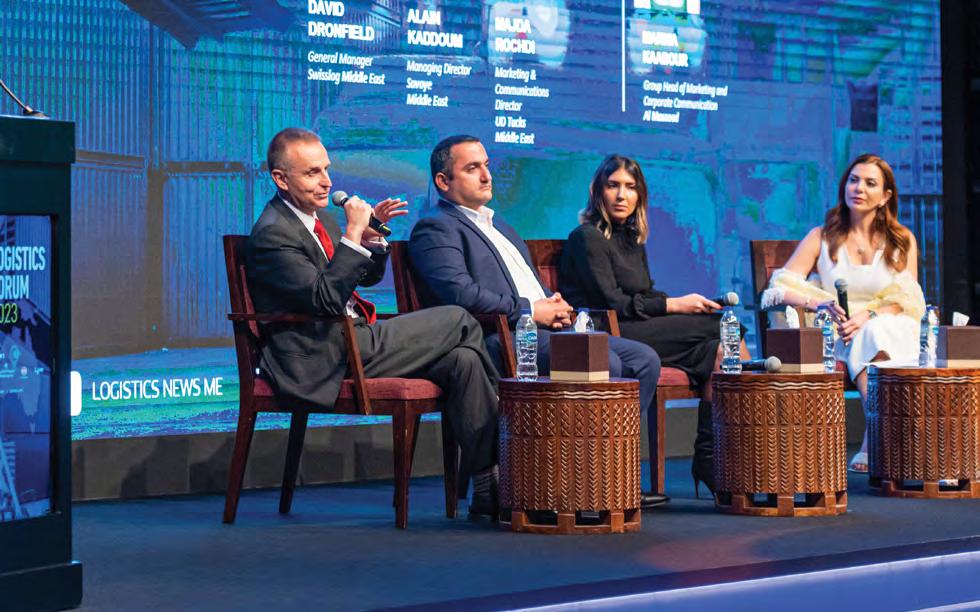
provided insight into the trucking sector. Technology breakthroughs, such as autonomous trucks, electric vehicles, and the Internet of Things, drive the trucking industry’s rapid revolution (IoT). She believes that, as a result, people should expect significant changes to both the workplace environment and their working practices.
This insightful panel discussed creating a road map for an automation strategy and how the human element still forms the basis of any successful transformation project. The primary area these changes might impact is the human capital one possesses and employs. Similarly, if handled properly, these same changes act as a source of employment. The panel also discussed how people are eager and prepared to
collaborate with sophisticated but intelligent devices like drones and robotics.
According to David, firms may increase their productivity, accuracy, and scalability by employing automated systems. He emphasised that all this could be done while saving money and improving the client experience.
Companies may position themselves to prosper in today’s fiercely competitive market and meet the changing expectations of
their consumers by putting the proper automation solutions in place.
Alain also emphasised that using automation in logistical operations requires a strategic approach, which was his main takeaway from the conversation. This requires creating a longterm vision that aligns with corporate goals and precisely outlining specific procedures within the framework of the market and clientele. At the same time, Majda
DAVID
“We have been talking a lot about the ability of robotics to transform warehouse operations. Mobile, intelligent robots address many of the most pressing issues warehouse operators face, like the need for greater productivity and throughput, in a way that delivers more flexibility and scalability than bolted-down approaches to automation.”
“In the medium to long term, and particularly in more established markets, truck drivers may face hurdles as automation and selfdriving technology continue to evolve. However, the industry’s transformation is also expected to generate fresh employment prospects,
PANEL 1 | TRANSFORMATION WITH ADAPTATION WITH AUTOMATION
such as jobs focused on maintaining and operating autonomous vehicles, logistics, and data analysis.”

ALAIN KADDOUM, MANAGING DIRECTOR AT SAVOYE MIDDLE EAST, SHARES, “It is believed that, while the resistance from employees to adopting automation is possible, it can also open new career opportunities in data analysis and other autonomous services. Additionally, we had the opportunity to share insights with the peer professionals as they discussed how automation can support sustainability initiatives, like streamlining the supply chain to use less energy.”
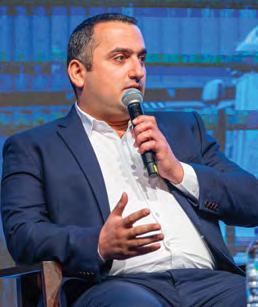
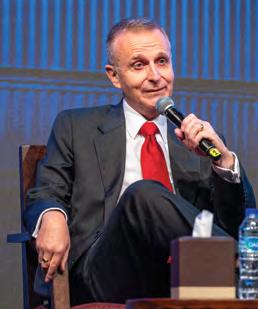
MARWA KABBOUR, GROUP HEAD OF MARKETING AND COMMUNICATION AT AL MASAOOD, COMMENTS, “Touching on the state of affairs for the society at large, there was no doubt that sustainability was discussed and that it has impacted the sector and will have its influence on future technologies which in turn has pushed for the delivery of upgraded software and machinery that if used properly will contribute to the lower carbon footprint.”


The aviation industry took a significant blow at the start of COVID-19 in 2020. The world’s uncertainties and fragile state of mind required them to be quick and active while the industry was still attempting to digest the new developments. Airlines had to step up their game with their cargo services to meet the world’s needs. Along with the uncertainty, there were a number of technological advancements, governmental regulations, and changes in the competitive environment to look at.
navigating the challenges. He focused on how new technologies reshape aerospace with artificial intelligence, the internet of things (IoT), aircraft systems and hybrid aeroplanes. Apart from that, he highlighted how digitalisation and sustainability efforts are game changers. Cathay’s Fly Greener initiative enabled their cargo customers to work out the carbon emissions of shipments and the cost to offset them, and then contribute to purchase carbon-offset projects.”
The second panel saw Rajesh Menon, who shared his essential industry insights from the airline perspective. Andrei Diminescu spoke about how technology is changing the aviation sector, while Robin Vermaat spoke on crucial topics, including the influence of leadership. Vibha Mehta, Editor-in-Chief of Logistics News ME, moderated the panel and helped the discussion amongst the aforementioned industry leaders flow naturally.
The rising need for technical developments integrated into supply chain solutions for aerospace and industrial repair facilities was emphasised by Andrei, the Founder and CEO of AirAi Network. He did provide his perspective on the happenings in the much wider sector. At the same time, Robin structured his discourse around the crucial components of leadership amid these interruptions, and
Rajesh contributed a sizeable portion of thoughts from an airline’s standpoint. Vibha continued the discussion by addressing essential facets of the aviation sector, including the dynamics of the air freight industry, difficulties the sector faces, governmental regulations, fuel costs, and sustainability.

Correspondingly, Rajesh shared how Cathay Pacific conducts its operations by
On the other hand, Robin explained why leadership is a paramount concern regardless of whether changes come suddenly or gradually. He says effective leadership gives employees comfort and motivates them to adjust to it more easily. Oddly enough, the panel also discussed the burgeoning e-commerce sector and how it influences the aviation industry to make changes that address economic demands and psychological needs. Express and quick deliveries are vital components of the e-commerce sector, which motivates the air freight and air cargo sectors to ramp up their performance.
ANDREI DIMINESCU, FOUNDER AND CEO OF AIRAI NETWORK, SAYS, “Air Cargo and any other Supply Chain related industry, in that sense, should navigate thru crisis using technology. It
all comes back to data and how you use it: The better you understand your demand, your market, your customer’s behaviour, the easier it is to adapt.”
ROBIN VERMAAT, CEO OF RV CONSULTANCY, ADDS, “It was my honour and pleasure being invited to sit on the panel and discuss with fellow peers and industry leaders while having the opportunity to network and exchange knowledge.”


RAJESH MENON, REGIONAL HEAD OF CARGO SOUTH ASIA, MIDDLE EAST AND AFRICA AT CATHAY PACIFIC AIRLINE, COMMENTS, “It was an honour to be able to share my knowledge with others from different logistics industry sectors. Not only did the forum give me the platform to share my knowledge, but it also gave me great insight into my fellow panellists’ experience within the industry. Overall, it was great to have an event that brings everyone from different logistics sectors together to share their experiences.”

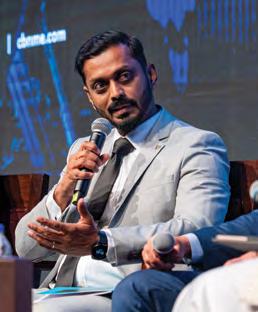
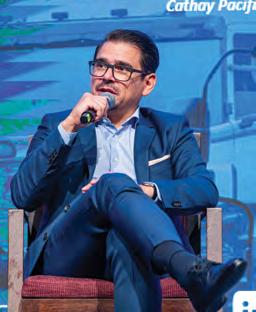
What we overlook is the fact that the food and beverage (F&B) business is highly reliant on the proper set of supply chains and logistical operations. A restaurateur may ensure that their patrons are satisfied by serving them food that is prepared with the freshest ingredients. This panel concentrated on the logistics and supply chain, a far less-discussed food and beverage ecosystem component.
6. What should one consider while selecting suppliers, clients, or partners?
7. What challenges do consumers face when choosing suppliers?
8. How can logistics firms and food and beverage establishments make sure the right product is available when it is needed while addressing environmental issues? (For example: How does the most recent news on a brief spike in the price of eggs and poultry products affect you?)
9. Can you describe the present food waste scenario from where you each operate?
10. The contribution that logistics makes to establishing food security.
11. Could you describe a few of your sustainable projects or plans?
Manufacturers of food and beverages are under pressure from several points throughout the value chain. The force that retailers are under the most strain is a direct outcome of the industry’s ongoing power transfer from producers to retailers. More and more market share and power are being concentrated in fewer retail chains due to ongoing grocery and other retail channel consolidation, giving them more clout when negotiating terms with their food and beverage suppliers regarding pricing, services, and supply chain technology. Companies in the food and beverage industries are
aggressively battling for growth, market share, and profitability while dealing with this demand from their retail clients. Nevertheless, companies are engaged in fierce competition to wring out little market share gains, sometimes at great expense to marketing and developing novel products.
Seymone Moodley moderated this panel, which included several well-known industry figures like Sooraj Mathew, Marwan Khalife, and Tarek Almuhanna.
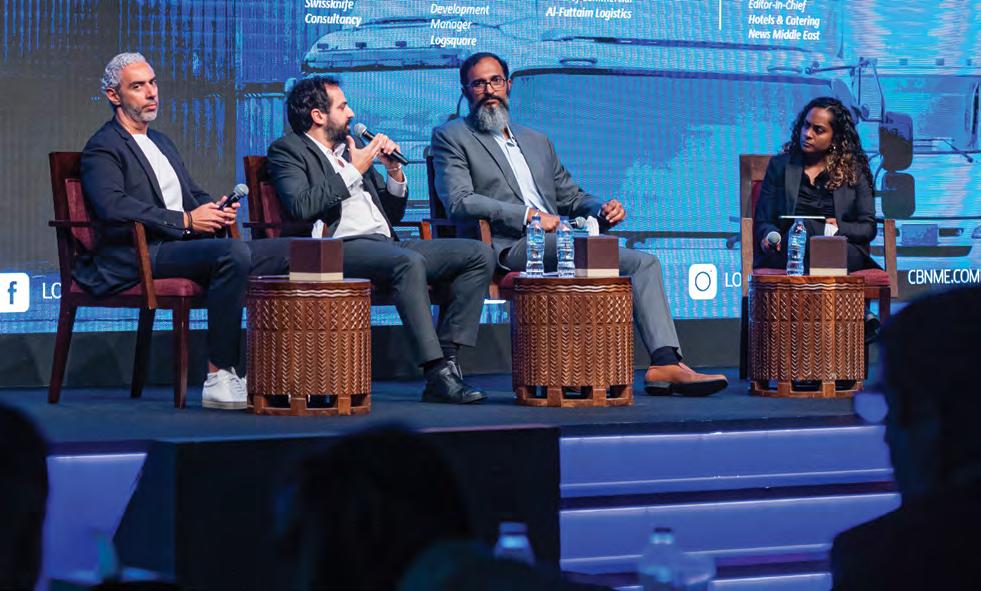
The conversation covered the following topics:
1. Let’s start by discussing your various responsibilities within the supply chain. What
are you doing in the food and beverage industry’s logistics and supply chain ecosystem?
2. What are some of the main issues you encounter in the F&B business among all the diverse industries you serve? (Includes from the perspective of commercial and F&B project management)
3. From the perspective of company development, what are your plans to meet the industry’s escalating demands?
4. What facilities and systems are required to guarantee the highest food handling, safety, and storage levels?
5. Let’s talk about developing a supply chain for F&B businesses.
12. What technological changes have affected the logistics and supply chain sectors?
13. In the context of your various responsibilities, how will the future of food look?
MARWAN KHALIFE, BUSINESS DEVELOPMENT MANAGER
– MENA, LOGSQUARE, SAYS, “F&B handling is critical, especially from a hygiene perspective—the less human touches, the lesser the risk of contamination. Hence, the industry is converging towards automation. Even SMEs are initiating the automation of the production lines and all links of the supply chain such as storage and distribution.”
TAREK ALMUHANNA, OWNER AND FOUNDER OF SWISSKNIFE, COMMENTS, “Throughout the discussion, we covered various topics, from supply chain management to inventory control to transportation logistics. It was fascinating to hear about the challenges and opportunities faced by those in attendance and learn about the innovative solutions implemented to address them.”
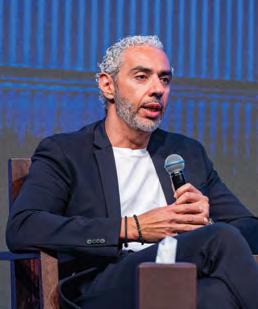
SOORAJ MATHEW, HEAD OF COMMERCIAL AT AL FUTTAIM LOGISTICS, SAYS, “In the logistics industry, we don’t own the products, so we have to create strategies that help us across industries. Even in the food and beverage industry, there are a variety of temperatures to consider: frozen, refrigerated, fresh, finished, ready to eat, defrosting, etc. So, determining where we will be adding sustainability in return needs a substantial quantity of data, which we have been gathering over the previous few years with short-term gains.”

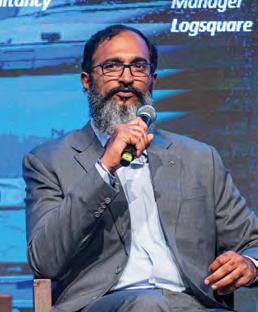
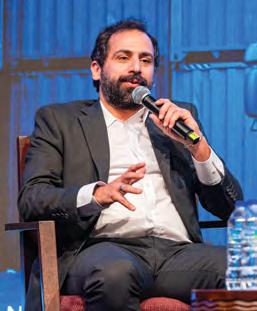
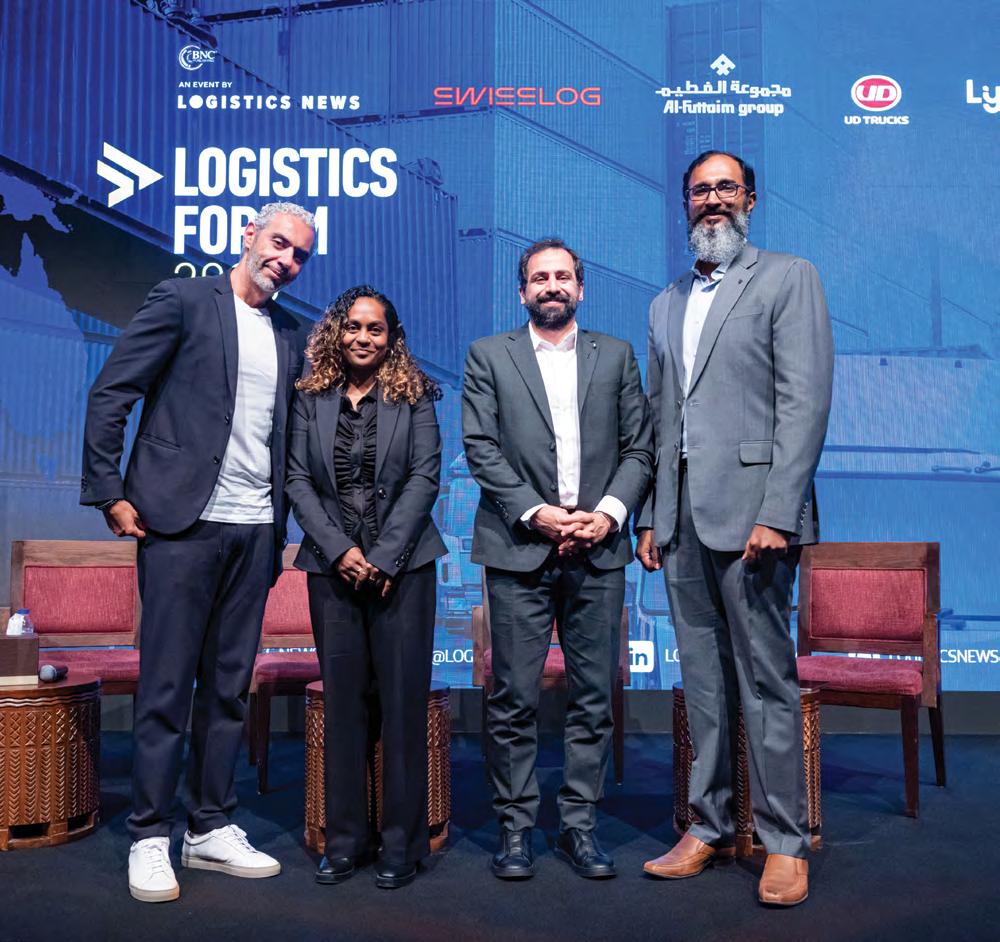
The LNME FORUM 2023’s last panel discussed how the e-commerce sector is changing the last-mile ecosystem in the region. Consumers like to have their online orders delivered within a day or, at most, the following day. This preference may be psychologically motivated, or the business model may have been modified to accommodate it. Correspondingly, between now and 2027, the size of the global e-commerce logistics industry is projected to expand by USD 404.84 billion at a CAGR of 20%.
Aby Sam Thomas moderated the fourth panel, including notable business leaders Shailen Shukla, Bassant Zein, and Juan Garza. Shailen started the discussion by providing a general overview of last-mile delivery in the UAE and the larger MENA region. We know that the e-commerce sector is also investing in cutting-edge technology like artificial intelligence, machine learning, and big data analytics to boost efficiency, decrease delivery times, and optimise
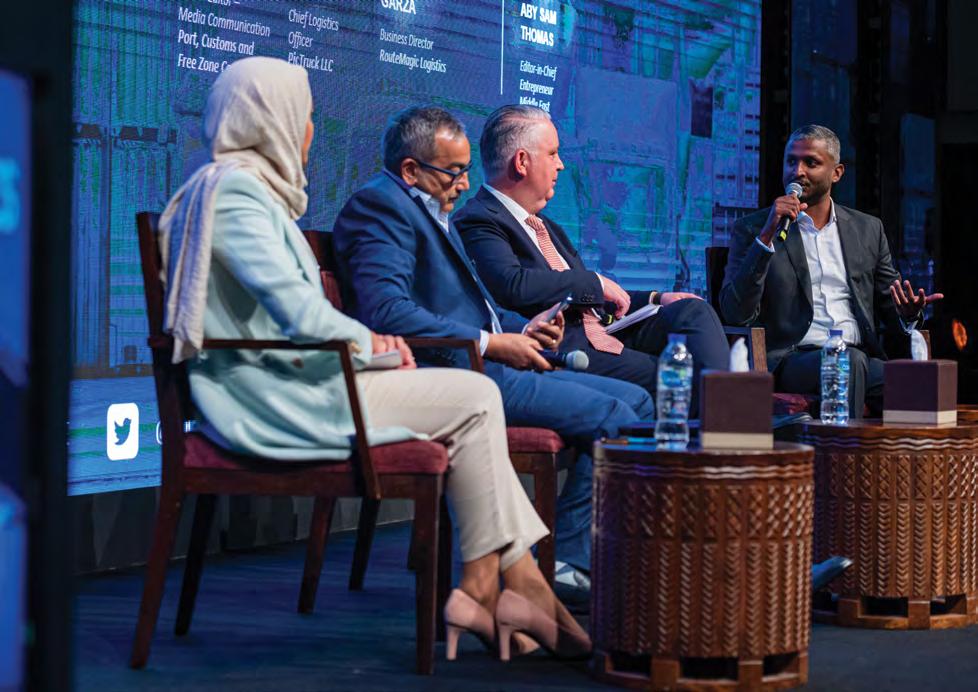
delivery routes. The environment for last-mile delivery has undergone a substantial transformation, and last-mile delivery startups and internet companies are now posing a more significant threat to established courier firms.
Then, concerning the future, he added more about ‘What comes next?’ ‘What will the future hold, and what trends should everyone involved in this sector be aware of?’ He revealed some fascinating information, such as how
autonomous delivery robots, smart lockers, and delivery drones are altering the business and will do so in the future.
Juan also discussed some of the significant challenges that the industry is currently facing. Juan highlighted that automation is a crucial issue for businesses to consider for adaptation not later but soon. He concentrated on how AI and machine learning would play a vital role in the logistics and supply chain sector, far beyond the last mile.
Aby shared his thoughts based on his expertise and relevant information, being outstanding in ensuring that the talk flowed well. Bassant, who has experience in the media, explained the customer-centric approach to knowledge acquisition. Customers are well aware that there are various retailers and delivery services, including FedEx and DHL, on the market, according to her, but identifying lastmile delivery as the link in the e-commerce supply chain that connects brands and customers requires extensive and methodical media campaigns. As a result, media departments should adapt to digital means of communicating the process to the very average customers. Players in the sector are well-established, and know-how supply chains function from A to Z in their complex fashion, but we cannot expect the customers to be aware of this.
BASSANT ZEIN, MEDIA EDITOR AT PORTS, CUSTOMS AND FREE ZONE CORPORATION, SAYS, “One of the biggest challenges that almost all logistics companies are facing since E-commerce had boomed in the market is how to reach the final leg, which is the customer, so it’s recommended that Companies working in the logistics field to reach out to the journalists responsible
for covering their news, in different media outlets and try to get him how the process sig going behind the scenes to ease the explanation of the process to the ordinary consumer.”
JUAN S. GARZA, BUSINESS DIRECTOR AT ROUTEMAGIC LOGISTICS, ADDS, “For me, the LOGISTICS FORUM 2023 was an opportunity to experience, in one single very well-designed event, comprehensive learning on the most relevant topics of interest for us, the logistics professionals; explained by real, active industry experts.”
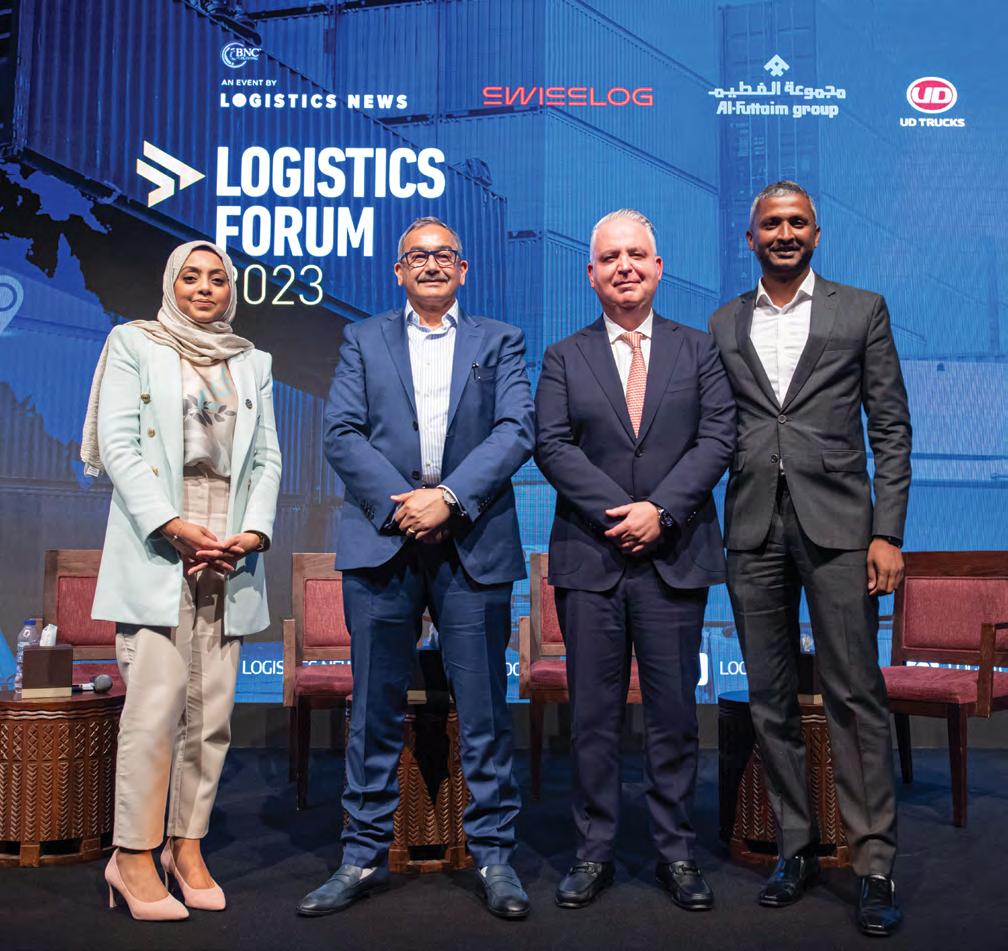
SHAILEN SHUKLA, CHIEF LOGISTICS OFFICER AT PICTRUC, COMMENTS, “Last mile delivery has become the new battleground for e-commerce companies as the Last Mile service is the only factor which is emerging as a USP while product lines are similar and often overlapping, and those who can provide a seamless, fast and reliable delivery experience will emerge as winners in the fiercely competitive market.”
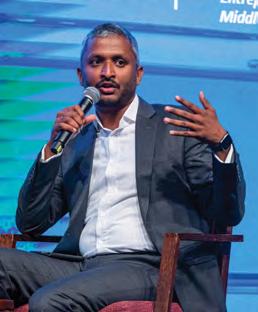

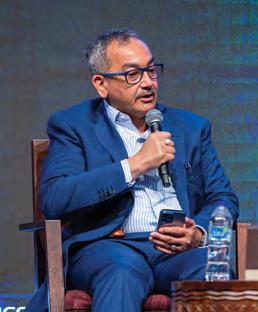


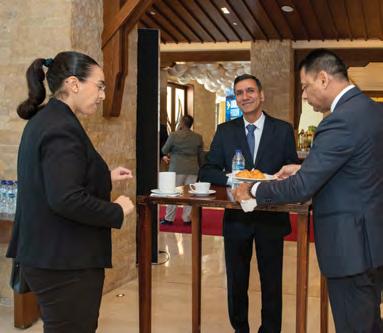
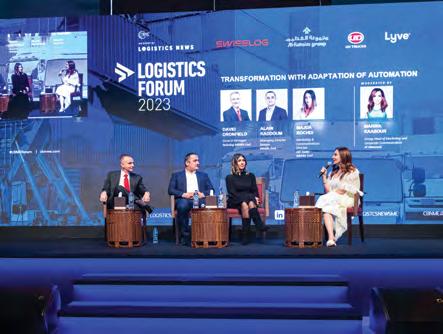
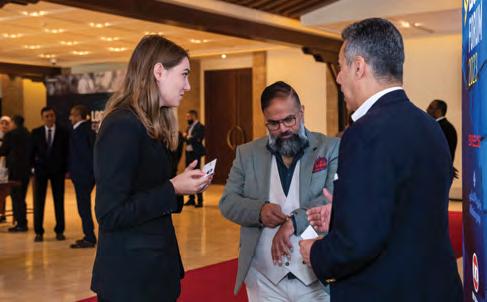

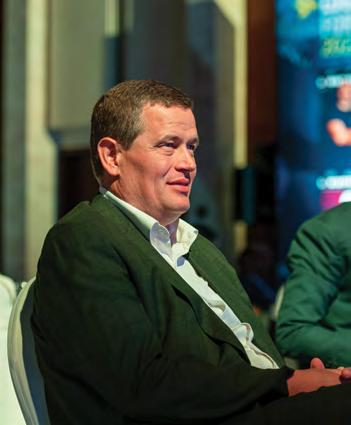
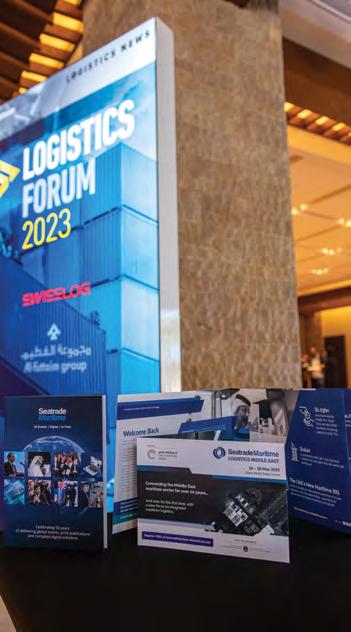









be awarded, with the first place receiving €50,000, then €10,000, and €5,000 for second and third place, respectively.
What are your key takeaways from the Fast Forward Challenge this year?
There were some genuinely outstanding ideas at the Fast Forward Challenge this year. Every single one of the ideas and pitches at the regional edition was pathbreaking, but ARC Ride showcased a robust, scalable model that incorporated a fleet of electric vehicles and the infrastructure for battery charging. We witnessed a definitive shift and growing commitment among young entrepreneurs to pursue sustainable business ideas. There was also increased collaboration using technology in transformational new ways.
Can you explain how blockchain technology eliminates the complexity of ports and shipping?
Blockchain can limit the number of known participants with access to business operations and thus mitigate any risk of malicious actors while supporting better performance. Blockchain also streamlines processes by replacing slow, manual processes that still rely on paper with digitized systems, thus accelerating the process while reducing any human errors. Moreover, moving the data to the digital space improves traceability, adding value by reducing any high costs of rectifying problems. Because blockchain has the potential to track tens of millions of shipping containers annually, it can significantly reduce delays and fraud, which could lead to billions of dollars in savings for the logistics industry.
Explain the DHL Fast Forward Challenge in more detail.
The DHL Fast Forward Challenge is a global competition to encourage companies across the globe to showcase innovative technologies in the logistics industry, focusing on sustainability. The challenge is part of the DHL Era of Sustainable Logistics Global Summit, a three-day event that brings together decision-makers, thought leaders and stakeholders to promote the development of cleaner, greener logistics. The DHL
Fast Forward Challenge recently concluded its regional final, witnessing Kenya-based ARC Ride emerge victorious. The winner will be able to participate in the final in Valencia this April, competing with other champions from across the globe. All DHL Fast Forward Challenge finalists presenting their solutions at the Global Summit will benefit from increased visibility and reach by offering their solutions to an audience of senior executives from some of DHL’s largest customers. Cash prizes will also
How does logistics impact the global economy?
Logistics is vital to the global economy and the backbone of trade and other entrepreneurial activities. The COVID-19 pandemic showed us the world’s reliance on the global logistics industry. In the absence of flourishing trade and commerce, entire economies can stagnate. In the Middle East, regional investments in infrastructure, air, and road capabilities are increasingly driving the growing global trade and logistics demand.
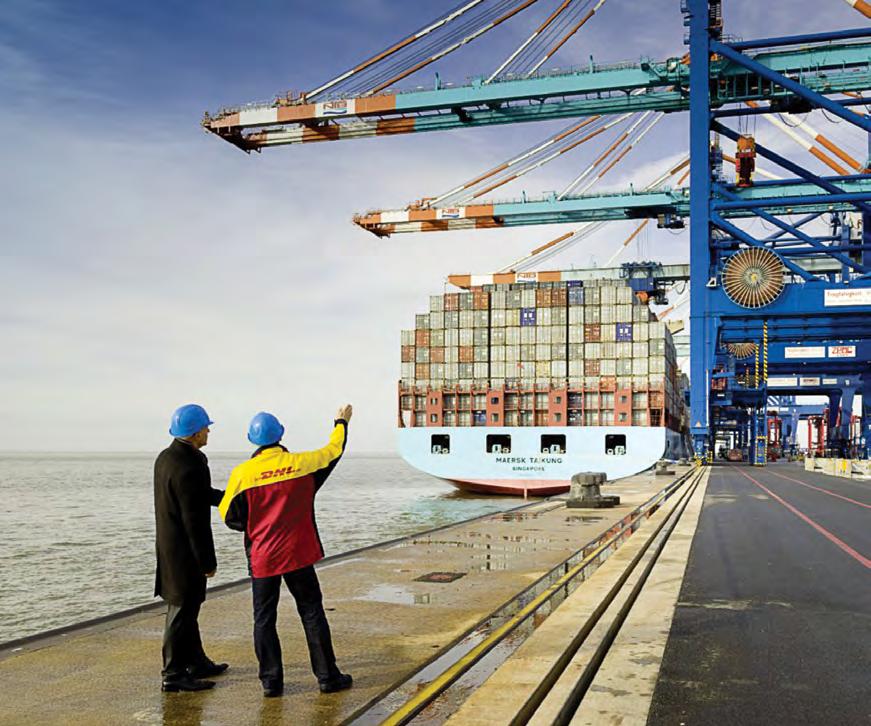
Amadou on Fast Forward Challenge, labour retainment, blockchain, and much more
CEO OF DHL GLOBAL FORWARDING, MIDDLE EAST AND AFRICA
Labour is still challenging to find in many markets. What is DHL doing to attract and retain workers?
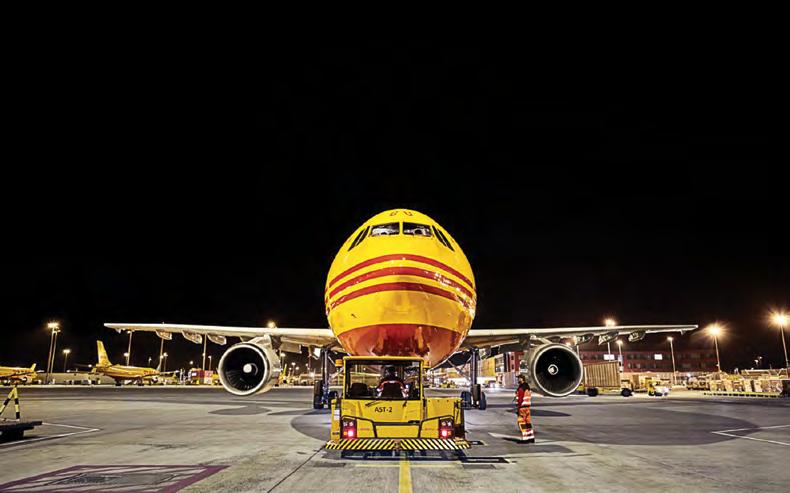

Labour shortages will continue to pose a challenge not just in the logistics sector but in other industries as well. Supply chain talent in the logistics sector is a significant concern for local businesses and global companies because future growth depends on increased sales.
DHL Global Forwarding combines digitalization and skills training for better resource optimization. For example, we have a Labour Share app in some markets through which DHL’s warehouse operations personnel can easily facilitate workforce sharing among the company’s facilities where surges are in demand. Technology can create a better platform for engagement, maximize workforce skills, improve job satisfaction, and lead to more creativity, better customer service, and, ultimately, a better organization. As a company consistently ranked as the Best Place to Work, we invest in our people and their professional growth through skills development programs and community outreach. We lead by example through various projects that foster inclusion, diversity, and sustainability. Through initiatives like Global Volunteering Day, SALAM, and other regional projects, DHL consistently builds on its core values to create an environment where people shine and grow with the company.
How do you see logistics market conditions from a domestic and international perspective?
The logistics market, regionally and globally, is being driven by two major trends – digitalization and sustainability. In the Middle East and globally, retail e-commerce remains a crucial segment of the overall logistics market as an ever-growing number of consumers shift their shopping activities online. Since millennials account for 73% of all professional B2B purchasing decisions, companies invest in digital solutions to meet their needs. Meanwhile, decarbonizing the logistics and transport sector is also climbing the agenda by reshaping consumer behaviour and green offerings.
Are there particular technologies that the logistics sector can focus on to improve operations?
Big data analytics, machine learning, sensors, IoT, and next-generation wireless are pivotal in strengthening supply chain resilience within the logistics industry. AI has enormous potential to improve supply chain efficiency by leveraging its prediction and vision-recognition capabilities, driving intelligent workflow automation, and delivering new customer experiences. It allows for high data transparency and availability in near real-time so that issues and disruptions can be identified quickly, and counter-measurements can be taken.
Looking ahead, where would you like to see the market a year from now?
Economists worldwide forecast weak economic growth in 2023. While larger companies are expected to weather the stormy waters ahead, small, and mediumsized operations will struggle in these turbulent conditions. Therefore, the focus will be on the efficiency of supply chains and resilience and flexibility. At DHL, we remain focused on harnessing globalization, e-commerce, digitalization, and sustainability for the profitable longterm growth of our business. We want to intensify the trade between Asia and the Middle East (UAE) and expand trade in Africa. We are very focused on enhancing last-mile delivery, a crucial component of e-commerce fulfilment, which can be made more efficient by deploying artificial intelligence and automation. We are working on some innovations, service upgrades and expansion plans to further these ambitions over the next few years.
expanding sector and think Green Marine Technology is the way of the future. Also, they are actively engaged in various research and development projects, such as creating our marine-grade battery system and our hydrogen fuel cellpowered eFoiler® vessel range extender.
The UAE has a tremendous opportunity to establish the standard for environmentally friendly shipping methods since marine technology is critical in advancing maritime trade in the region. “We must work to lessen the effect of the marine sector, which accounts for roughly 3% of annual global greenhouse gas emissions.” A great example of this action is the Clydebank Declaration, which was unveiled at COP26 and calls on countries to create six ‘green lanes’ by 2025 to hasten the creation of zero-emission fuels, lowcarbon supporting infrastructure, and efficient laws and regulations.
Green Marine Technology’ describes the application of ecologically responsible and sustainable technologies in the maritime sector. This entails creating and implementing clean propulsion options and using energysaving tools and strategies to reduce fuel use and emissions.
By designing and producing highperformance, zero-emission hydro foiling vessels, Artemis Technologies is passionate about promoting the development of Green Maritime Technology. The vessels include cuttingedge technology, such as our exceptional electric drivetrain that offers efficient, clean propulsion.
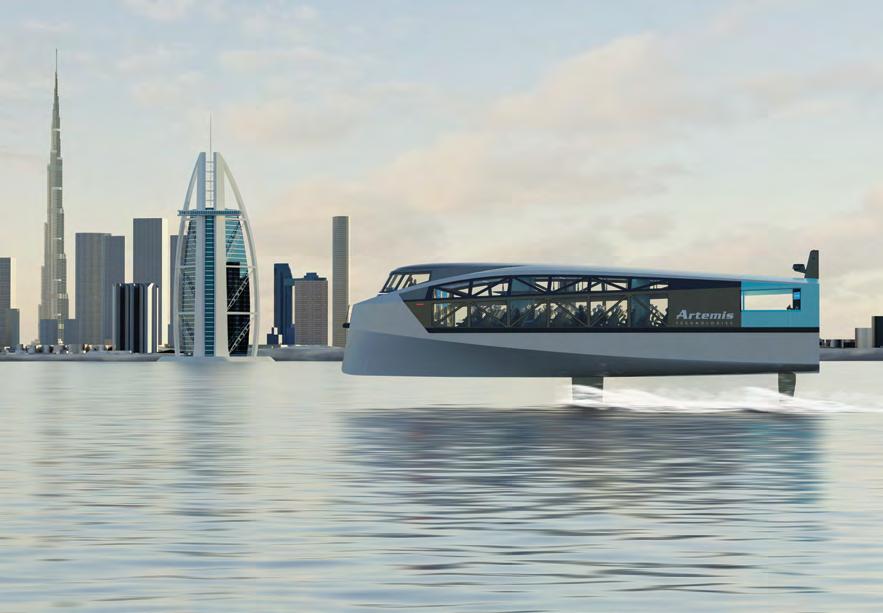
It is impossible to exaggerate the value of green maritime technology. David Tyler, Commercial Director at Artemis Technologies, states, “The maritime industry is a big contributor to global carbon emissions, and we must take action to lessen our influence on the environment.”
“We can lessen our carbon footprint and build a more sustainable future for future generations by using sustainable habits and technologies. Our goal at Artemis Technologies is to advance Green Marine Technology and foster innovation in this significant area. Our state-of-theart technologies can completely change the sector, making it more profitable, efficient, and environmentally benign.”
They are delighted to be setting the pace in this dynamic and quickly
“Hence, by employing unique technologies like our zero-emission hydro foiling vessels, our company is committed to developing sustainable shipping practices. Our ships are built to use less fuel and emit fewer emissions, which helps the world achieve the Paris Agreement’s goal of keeping global warming to 1.5 degrees Celsius,” David continues. Correspondingly, the country can encourage sustainable trade practices, spur economic growth, and strengthen the UAE’s position as a central international trading hub by utilising technology to lessen the environmental impact of the maritime industry.
David also provided several vital tenets for developing maritime technology in the UAE. He first thinks that there needs to be a regulatory environment that supports innovation and financial investment in new technology. The UAE has previously shown that it is committed to this by announcing several programmes that encourage the creation of exclusive technologies for the marine sector, such as the Innovation Quay and the Innovation Lab of the Abu Dhabi Ports Authority. Secondly, the collaboration between representatives from business, government, and academics must receive much attention. “At Artemis Technologies, we think working together is essential to advancing technology and
realising its full potential. For instance, we can stay at the forefront of innovation and extend the bounds of what is possible thanks to our connections with top universities and research organisations.”
Thirdly, there must be a large talent pool of qualified experts with the know-how to create and apply new technologies. He thinks that because of the vibrant community of entrepreneurs and inventors in the UAE, it is crucial to continually invest in education and training to have the competent workforce needed to advance the maritime sector.
Finally, there needs to be a readiness to adopt new shipping technology and methods. “The UAE has demonstrated a remarkable openness to innovation and a commitment to sustainable shipping practises. We feel that this mindset will be crucial to maritime technology development in the region,” shares David.
David thinks that the UAE’s smart shipping industry has a bright future. Given the UAE’s status as a central international hub for trade and shipping, the region is well-positioned to take the lead in implementing smart shipping technology.
Using data analytics and machine learning to enhance shipping operations is one of the main areas of concentration for smart shipping in the UAE. One can pinpoint areas for improvement and make datadriven decisions to optimise shipping routes, lower fuel consumption, and lessen the environmental effect by gathering and analysing data from ships, ports, and other sources.
“Yet, in contrast to the automotive, aviation, and rail sectors, I believe the global
maritime transport sector has not invested enough in innovation, which has raised pressure to develop and execute disruptive technology to meet ambitious emissions reduction targets.”
If the industry is to advance, global standards must be created and applied more swiftly to establish an institutional framework that supports a globally sustainable and environmentally friendly maritime sector. The Middle East will host COP28, which will present an opportunity to demonstrate our marine tech solutions and reaffirm our commitment to intelligent green solutions for the maritime industry.
Smart shipping is being picked up by most of the industry leaders. Thus, Artemis Technologies offers innovative solutions and services for the marine industry. Many water-based communities are reinvesting in water transit infrastructure as they struggle with the issue of expanding populations, congestion, and pollution. Operators are under pressure from the public and the government to green their fleets. “We have received interest from throughout the world in the Artemis EF24 Passenger because it is a practical public transportation option that strives to do this, including from eco-tourism and busy metropolitan commuter services,” shares David.
Second, the region’s competence in using advanced materials and composites can help improve maritime vessels’ toughness and longevity, lowering maintenance costs and lengthening vessel lifespans.
Finally, they will be able to maintain their position at the forefront of innovation in the maritime sector because
they collaborated with top universities and research centres. “We can advance technology development and the industry by working with other industry participants and exchanging knowledge and skills.”
The UAE’s objectives for a more sustainable and effective marine industry align with its commitment to sustainability and innovation. “Together, we can hasten the advancement and implementation of green marine technology, advancing the industry’s transition to a more sustainable future,” claims David.
Additionally, it is increasingly evident that AI permeates many industries, and the marine industry is no exception. The potential uses of AI in this sector range from strengthening safety and security measures to optimising vessel performance.
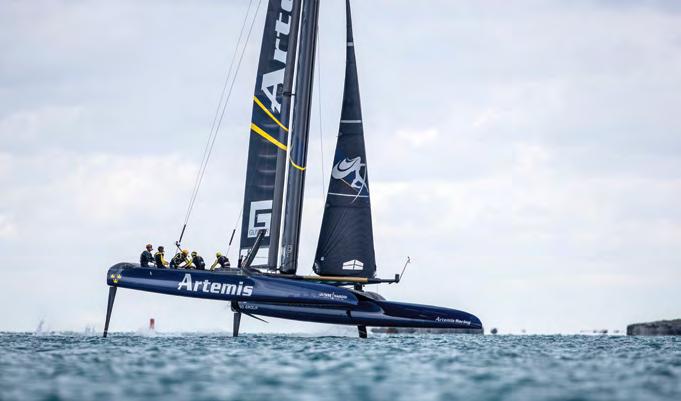
Automation of vessels is one key area where AI is anticipated to have an enormous influence. The creation of autonomous ships, which might navigate and make choices without human interaction, may fall under this category. Significant gains in efficiency, as well as decreases in costs and environmental effects, might result from this.
According to David, “Taking into consideration variables like weather patterns, fuel use, and cargo demand, AI
may also be used to improve shipping routes and timetables. Limiting fuel use and emissions might shorten delivery times and lower shipping costs while promoting more environmentally friendly practices.”
At Artemis Technologies, sustainability is at the core of everything we do. “Sustainability, in our opinion, is more than a trendy term; it is a crucial component of our obligation as a marine enterprise. To lessen our influence on the environment and encourage sustainable habits, we have included a variety of sustainability measures into all aspects of our operations.”
They emphasised sustainability in their products and services and other initiatives. “We use cuttingedge technology and materials that are more energy and ecologically friendly while designing our goods,” the company claims. For instance, their high-speed foiling catamaran’s autonomous flight control system combines cutting-edge sensor technology to maximise efficiency and minimise energy usage.
David adds, “We also engage with other industry participants, governments, and NGOs to find sustainable solutions and advocate best practices for the benefit of the industry and the globe.”
The new building has five floors and over 350,000 square feet of space, with 2.1 million cubic feet of storage capacity. It houses over three kilometres of conveyance equipment and our cutting-edge operational technology and procedures.
“We are excited to announce our latest Fulfilment Center in the UAE as customers mark the Holy month of Ramadan and begin preparations for Eid,” adds Prashant Saran, Director of Operations for Amazon MENA.
“We call our warehouses’ Fulfilment Centres’ because the entire process is fulfilled
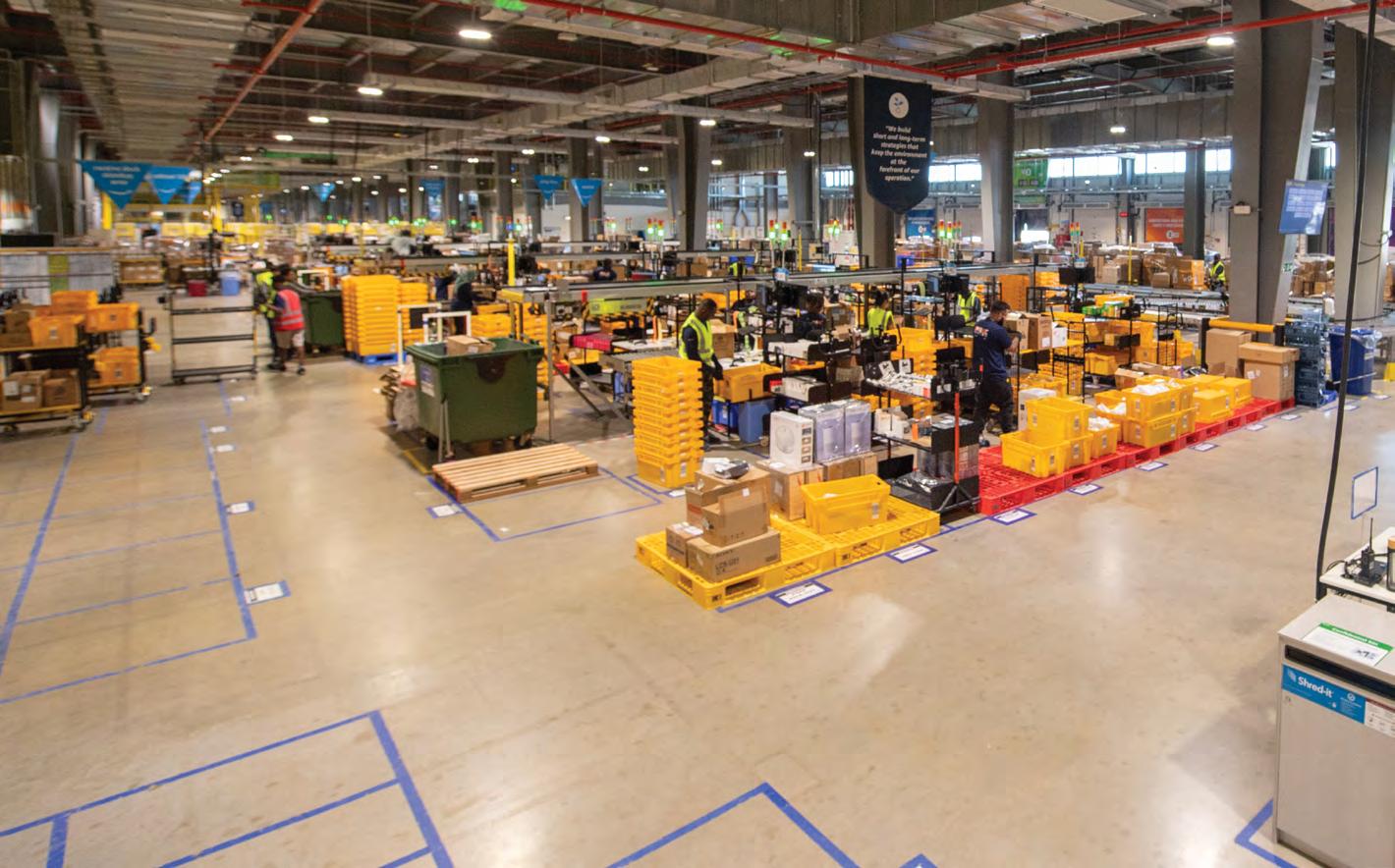
Vibha Mehta speaks with Prashant Saran, Director of Operations for Amazon MENA, to know more about Amazon’s increasing footprint in the region
from start to finish—inventory comes in from sellers and is shipped out directly to customers. In these buildings, the latest Amazon technology and employees come together to raise the bar of customer experience, ensuring fast, reliable, and convenient delivery.”
This investment will increase their overall storage capacity by 70%, allowing them to keep millions of items and provide clients with more options. With access to Amazon’s topnotch logistical know-how and shipping technology, thousands of small and medium-sized enterprises in
the UAE will be able to expand their online operations and their companies thanks to the company’s increased capacity.
Additionally, as the UAE’s digital economy continues to expand, the range of roles, training, upskilling, and mentorship programmes offered to employees at the Fulfilment Centre will help them develop skill sets applicable across the industry. Prashant continues, “We believe that our investments will assist in accelerating the expansion of the UAE’s ecommerce sector by sharing best-in-class expertise and best practices.”
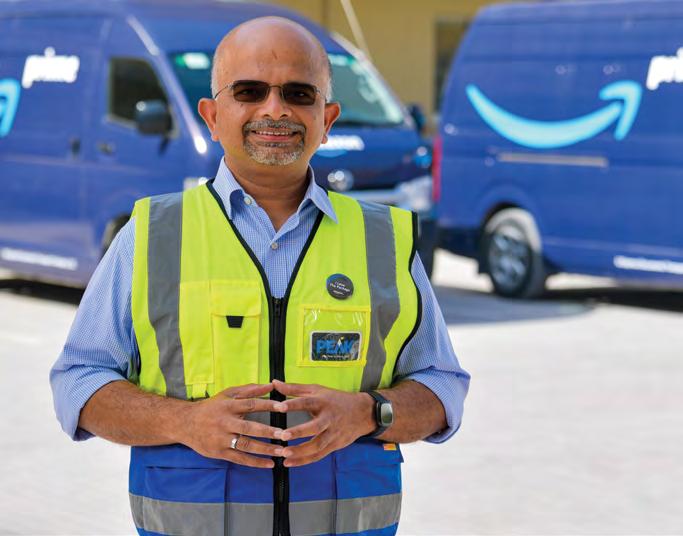
Amazon is renowned for continuously innovating on behalf of its customers to guarantee a quick, simple, and dependable buying experience. Although a large portion of the technology in the Fulfilment Centres is invisible, it nonetheless constitutes the foundation of their operations. “We use machine learning and artificial intelligence to define where products are and how they should most efficiently move from point A to point B,” adds Prashant.
Complex algorithms map the route of a package in the most efficient way possible – from when it enters the Fulfilment Centre to when it arrives at a customer’s doorstep. With the help of innovative technology, Amazon constantly raises the bar on
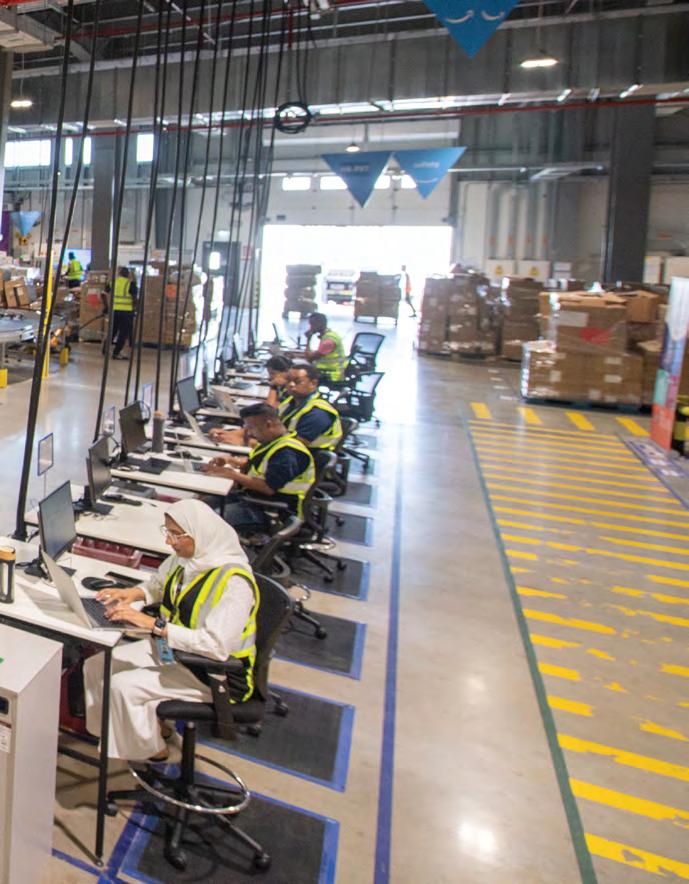
both safety of employees, as well as the speed and quality for the customer.
The way they organise the inventory is one of the things that makes Amazon Fulfilment Centres innovative and savvy. At this fulfilment centre, all the stock is arranged randomly. Prashant emphasised, “Our systems know where every item is situated and optimises the picking order to make the process as efficient as possible, even though the randomness may appear chaotic to an observer.” The optimum path is given to staff using sophisticated algorithms and optimised to minimise walking throughout the facility. Technology also drives the entire pack process, enabling internal quality control processes.
“TECHNOLOGY IS THE KEY TO ACHIEVING A SEAMLESS CUSTOMER EXPERIENCE. SERVICES LIKE REAL-TIME ORDER TRACKING AND FLEXIBLE DELIVERY OPTIONS CAN BE ACHIEVED THROUGH ADVANCED DIGITAL TOOLS.”
The company’s box suite technology suggests the ideal box size to guarantee item protection and environmentally friendly practices. As a result, they may use less packing and fit more products per van. Moreover, routing technologies enable them to employ fewer cars on the road by reducing the number of empty kilometres they cover.
Additionally, during the holy month of Ramadan, the gifting tradition plays a vital role. “We are constantly inventing on behalf of customers to meet their desire for lower prices, better selection, and convenient services. Our Fulfilment network plays an integral role in supporting demand, especially during peak customer occasions such as Ramadan and Eid,” adds Prashant. With 2.1 million cubic feet of storage space, or more than 22 Olympic-sized swimming pools, the new Fulfilment Centre can house millions of products. Thanks to the new facility’s additional capacity, they can provide customers
with an even more extensive range of products during the bustling Ramadan season.
The ‘unattended delivery’ option is also being expanded for consumers this Ramadan. This allows customers to securely deliver packages to a desired location, such as a front door, security desk, or reception and includes notification features like a photo on delivery. “This service offers a frictionless delivery experience and significantly expands our flexible delivery alternatives for busy UAE consumers.”
As Amazon’s network expands, they continue to offer chances for business owners and SMBs in the logistics and delivery industry in the United Arab Emirates to take advantage of their infrastructure, technology, and training to build their companies as Delivery Service Partners (DSPs).
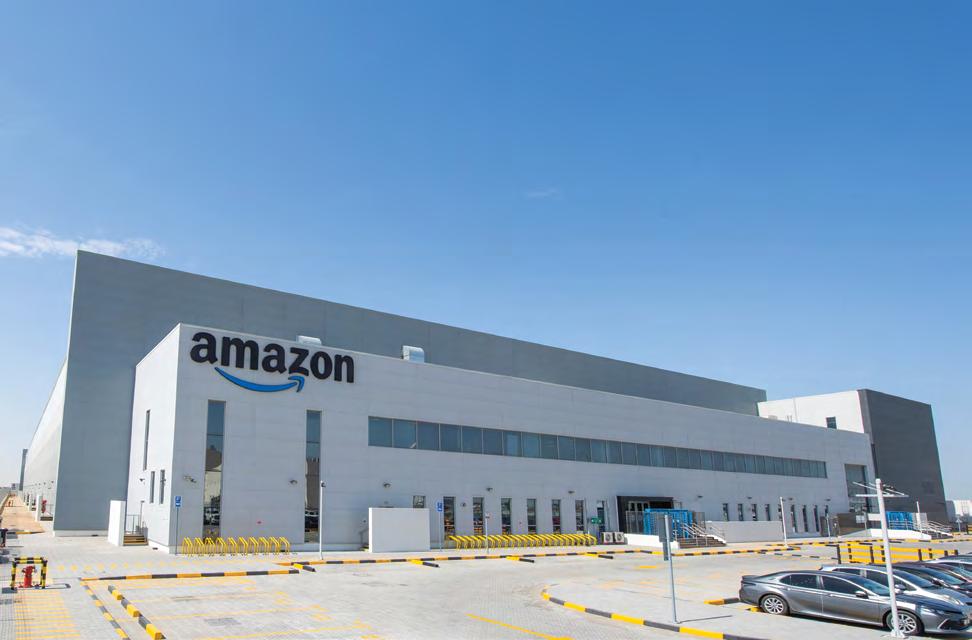
Now, the Amazon network in the region consists of 65 owned and third-party delivery stations spread across the UAE, Saudi Arabia, and Egypt, more than 13 Fulfil-

ment Centres, 720 external fulfilment nodes, and more. According to Prashant, “Building our DSP network will help us to continue to reach more locations and remote areas as we continue to grow. Furthermore, thanks to Amazon’s operations network in the UAE, fuelled by cutting-edge technology, optimised transportation services, devoted staff, and
partners, fast, free delivery of Ramadan and Eid orders is made possible.”
When Prashant was questioned about how the new facility will help SMEs, he emphasised that every time a new Fulfilment Centre opens, it has a transformative effect on the host city’s economy. It was launched and immediately impacted talent development, ecommerce sales growth, and entrepreneurship acceleration.
By utilising Amazon’s unique fulfilment network and global technologies to store, pick, pack, and ship customer orders, entrepreneurs and independent sellers may reach online customers through the Fulfilment by Amazon (FBA) model. Most of the thousands of merchants on Amazon.ae who sell things on the website are small and medium-sized businesses (SMBs). “Many SMBs ventured into e-commerce for the first time using our simple and convenient process to start selling online, access to listing tools,
safe payment processing, promotional features and customer service.”
While the UAE had announced 2023 as the ‘Year of Sustainability’, Amazon
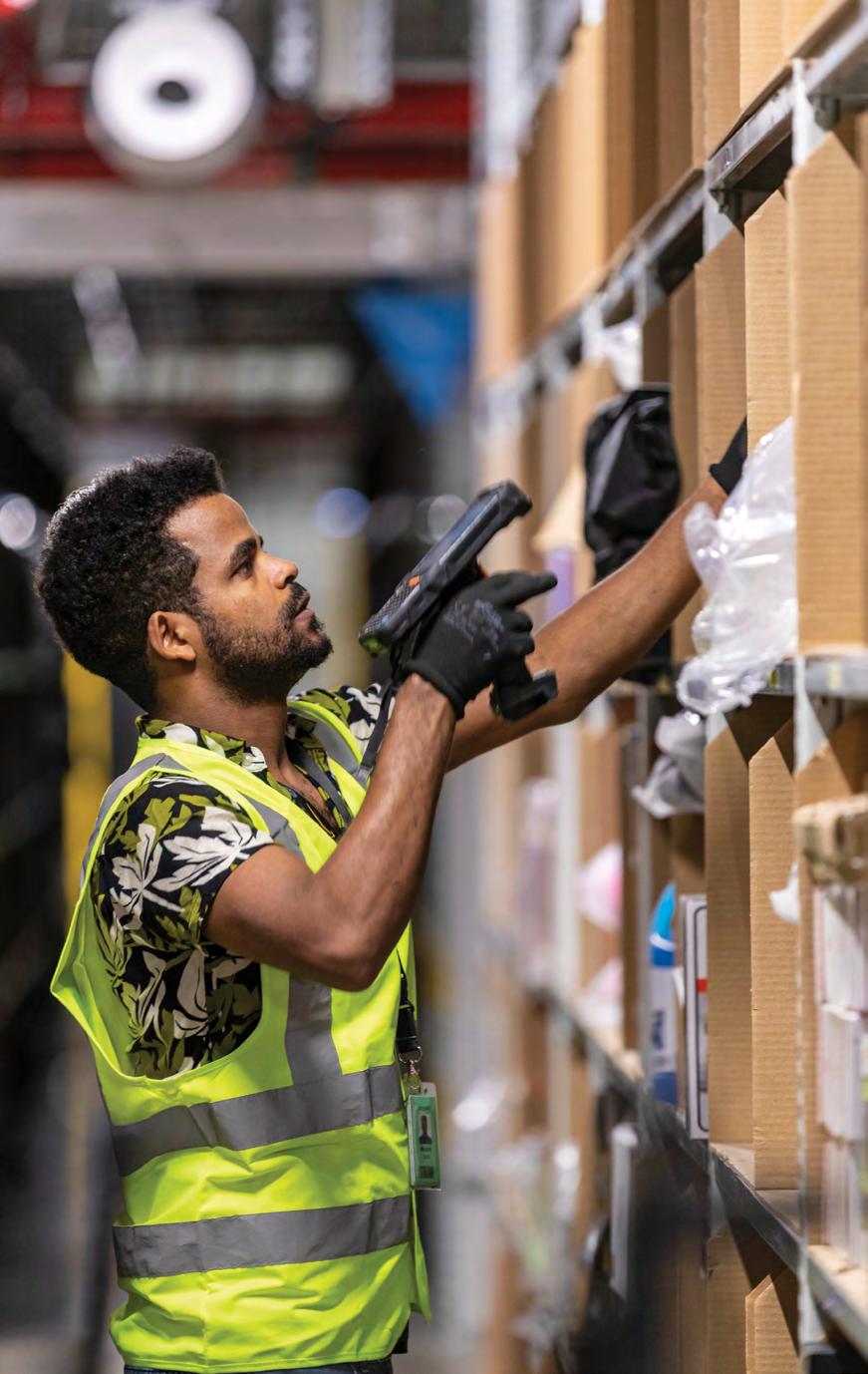
MENA also follows The Climate Pledge – a vision to be net zero carbon across all their businesses by 2040.
“In MENA, we are implementing carbon reduction
practises across all facets of our business, with a focus on three key pillars: building energy-efficient infrastructure powered by renewable energy; transforming our
transportation network with new technology, electric vehicles, alternative fuels, and delivery methods; and reducing packaging waste through collaboration and innovation.”
Correspondingly, the UAE Government is making substantial efforts to speed up the nation’s transition to a digitally enhanced and diversified economy, opening up many prospects for the e-commerce industry. According to market research, e-commerce is expanding quickly throughout the MENA region, with the UAE taking the lead. A 2022 Dubai Chamber of Commerce analysis predicts that the UAE’s e-commerce business will grow from US$4.8 billion in 2021 to US$9.2 billion by 2026. The adoption of e-commerce is accelerating, and e-commerce logistics must quickly keep up with last-mile delivery and fulfilment.
“Technology is the key to achieving a seamless customer experience. Services like real-time order tracking and flexible delivery options can be achieved through advanced digital tools,” exclaims Prashant. From the moment an item reaches a fulfilment centre until it arrives at a customer’s doorstep, advanced algorithms at Amazon plot the product’s itinerary most effectively. They employ technology to speed up delivery times, guide drivers on delivery routes, and maximise efficiency on the road. “We continue to innovate on behalf of our customers to ensure a fast, safe and convenient shopping experience as we expand our footprint across the region,” concludes Prashant.
Richard Cowling, Director of Operations at Gates Hospitality shared with us about the essentials of logistics and supply chain
How essential are logistics and supply chain operations in the hospitality industry?
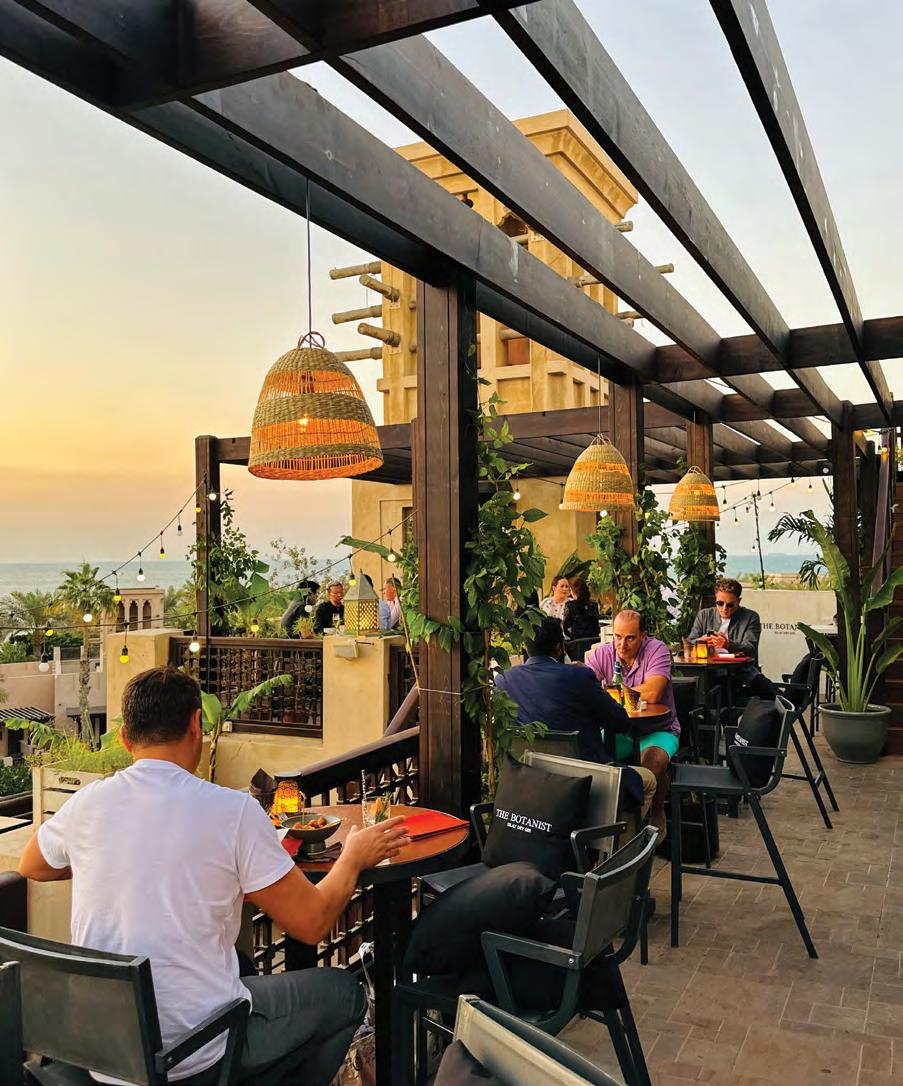
Logistics and supply chain operations are vital to our industry, and this has been highlighted in the last few years, during and post covid. The massive disruptions Globally have impacted product availability and price, driving up inflation throughout the world markets. Over the last ten years, we have seen an enormous shift in suppliers coming to the F&B market in the UAE and the range of products available in the marketplace support the growth of the industry overall and the vision of Dubai to be a food tourism destination.
What are the key pillars for your portfolio for smooth supply chain management?
We never stop learning. We are always looking for new products to market, suppliers and ingredients that we can use to enhance our businesses financially and from a guest perspective. One of our key pillars as a company is Engage, which is particularly relevant to our supply chain partner with whom we engage daily. While we are always looking to innovate with fresh new ideas and produce, we always value the significant relationships we have built with our suppliers over the last 12 years.
How does supplier consolidation support the smooth functioning of various eateries you hold?
Supplier consolidation should, in theory, streamline processes and enhance the efficiency of our dayto-day systems, reducing costs and improving margins. As an industry, we should also be mindful of the scale of such consolidation is not in jeopardy of the smaller, specialist suppliers who are passionate experts in their field and either import specific high-quality ingredients from markets or, as we are seeing a growing sector now for grown in, or manufactured in the UAE.
How does purchasing power play a vital role in the hospitality industry?
Purchasing power will always significantly impact a company’s financial capabilities, driving down costs and helping to represent the best value for money for our guests. We work hand in hand with our supply chain partners to continually strive to get the best quality ingredient at the best value for money so that we can follow this philosophy into our menus.
Where do you see logistics and supply chains shifting the F&B industry?
As the UAE F&B market grows at the fantastic pace it is currently at and continues to mature in terms of guests’ expectations and demands, we can expect to see more and more products being available in the market, suppliers will hold more stock, and availability will be improved significantly. The explosion in locally grown produce and the technology involved in driving forwards the agri-tech industry is both exciting and sustainably responsible. Passion-based farmers are now using this technology in harmony with local land and oceans to create produce locally that would previously have to be transported thousands of miles. This impacts costs long term, product freshness, shelf life and availability.
How are F&B outlets adopting automation in their operations?

Automation in purchasing continues to develop alongside purchasing departments. This allows improved communications between suppliers and the venues and better accuracy in purchasing loose items and bulk produce.
What are the turning points in a competitive landscape for the hospitality industry in the region?
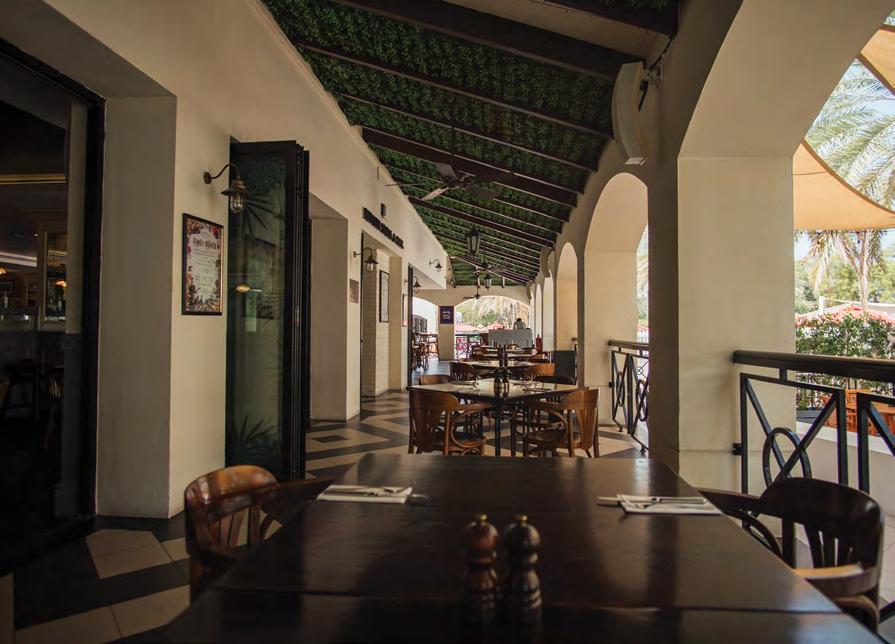
The enormous potential of the locally grown and home-produced markets not only does make sense from a sustainability standpoint but also from a food safety perspective as the region heads closer to the direction of controlling its source ingredients and becomes less reliant on global markets and the associated fluctuations.
How are you adapting sustainability in your operations?
We have made a considerable effort over the last few years to lead changes in behaviour towards sustainability, from being the first to reduce single-use plastics in all our venues and ending the use of plastic straws to some of our current sustainability initiatives, such as our own vegetable and herb gardens in our media. We have worked alongside and supported our local supply chain partners as they have developed their products and always look to use locally grown or made in the UAE wherever possible, supported by international suppliers who also share our vision around sustainability and reducing our impact on the planet in all areas of our operations.
Additional comments
We work with some of the biggest suppliers in the market, as we will always need to drive value for our guests. However, quality and sustainability are at the heart of everything we do, and we love meeting new and exciting local partners. We currently have vegetables explicitly grown for
the folly, planted around a calendar developed alongside our local farming partners and used by the culinary team to engineer menu changes and showcase the best of the UAE.
NBF participated in FUJCON 2023 in Fujairah
The Fujairah Bunkering & Fuel Oil Conference (FUJCON 2023), which took place from March 13–15, was attended by the National Bank of Fujairah (NBF), which had already confirmed its attendance. Participants in the downstream oil and maritime industries had the opportunity to discuss the issue of “the Maritime Energy Transition and Future Fuels” at the event, and NBF’s involvement reflected its extensive knowledge and experience in both areas.
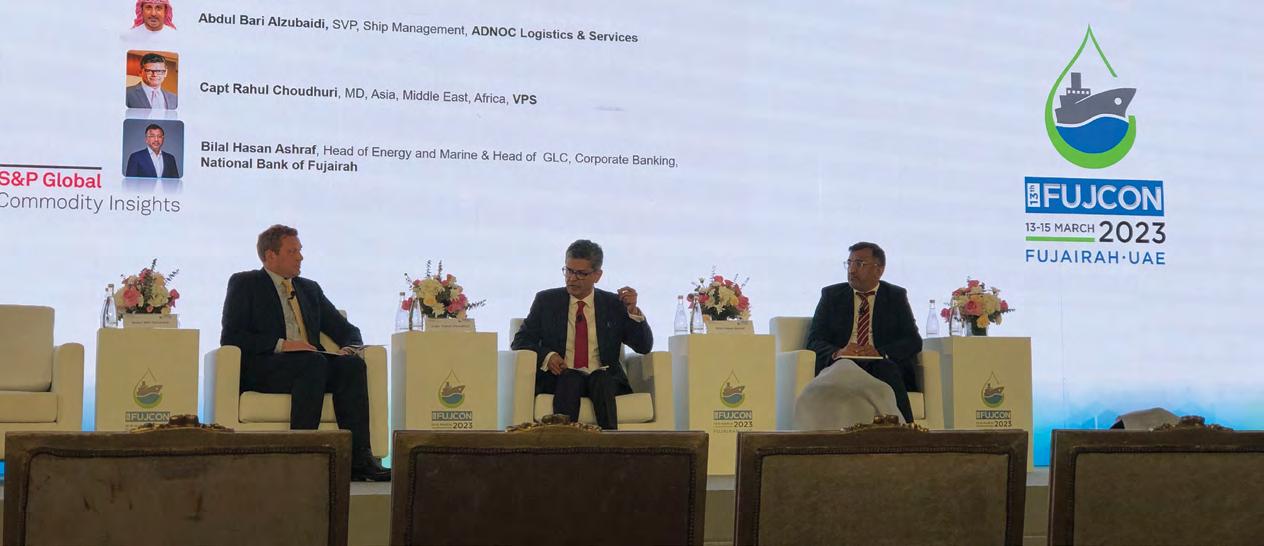
The thirteenth edition of the event, which was organised by global industry analysts S&P Global, was attended by His Highness Sheikh Hamad bin Mohammed Al Sharqi, member of the UAE Supreme Council and ruler of Fujairah.
Speaking on the forum’s sidelines, Vince Cook, CEO of NBF, commented, “This year’s edition of FUJCON reflects
the intersection of two areas of critical importance to NBF – the marine industry and sustainability. Our longstanding experience and deep expertise in working with the marine and oil industries give us a unique understanding of their banking needs and allow us to develop the solutions we can offer as these critical industries evolve. As the marine and oil industries look to align with sustainability measures across the region and beyond, particularly around the uptake of clean energy sources, we see exciting new opportunities opening.”
The forum, an established fixture in the calendar, was expected to draw participants from the UAE and other countries in the MENA region and beyond. To discuss the energy transition and carbon reduction standards pushing a paradigm change in the marine industry, it gathered banks, oil and bunker producers/traders, oil majors, national oil corporations, shipowners
and operators, refiners, attorneys, and more.
On the first day, the opening session featured a speech by Bilal Hasan Ashraf, Head of Energy & Marine at NBF, who discussed the importance of finance in the forecast for the maritime sector. The session included viewpoints on decarbonisation, the energy transition, future fuels, fuel sustainability in the maritime industry, and the chances for cooperation created by the green transition, new technologies, and sustainability objectives.
Lastly, the FUJCON 2023 examined market developments and Fujairah’s future fuel options from the supply, operational, environmental and economic perspectives, as well as the possible technologies, investments, delivery infrastructure and industry collaboration needed to uncover new green maritime solutions and achieve sustainability goals.

















